#absolute poetry and cinema
Explore tagged Tumblr posts
Note
logically i know it doesn't matter what other people think, but it annoys me when people ignore character development to make "happy endings". i like a happy ending but i like it when the good things make sense and don't undo character development. for me going back to fred doesn't make sense after tubbo realized it was a dangerous, unstable relationship and started mending his relationship with morning crew and building fobo. i don't think a good ending needs to include every good option. it just needs to end with a character feeling happy and having made some kind of progress or improvement
You are so valid and right for that.
Disregarding clear character development and growth just to make them fit in the ending that you want is so frustrating to me. Qtubbo had such an amazing character arc from being an egg babysitter and risking his life for kids that weren’t his in purgatory to becoming a father who’s entire world revolves around his daughter. He has his ups and downs, but ultimately puts his own wants and needs to the side for his daughter to be happy. His character went from being lonely and only having purpose that revolves around the worth that others give him, to finding a reason to keep moving in his daughter.
Honestly, the storyline of single guy who is reckless and antagonizes the Feds to a loving father who made creation to keep his daughter safe after his death is so beautiful to me. I think so many stories end with romance anyway, it’s so satisfying to see a happy ending where the character is fulfilled and loved in another way. There’s so many different types of love and I think that qtubbo is a great example of most of them, with the final love between a father and a daughter being the most prominent.
#sorry that was a rant#but y’all know what I mean#romance is so overrated anyway#but a father who finds his will to live in his daughter he would give his life for???#absolute poetry and cinema#tubbo#qsmp#qsmp tubbo#fandom crit#discourse#< just in case#anon asks
18 notes
·
View notes
Text
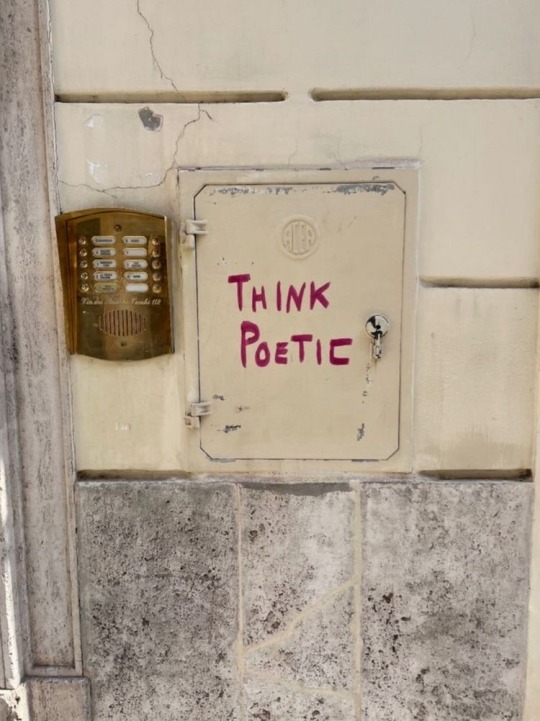
#writing#thoughts#writers and poets#literature#streetart#cinema#poetry#poesia#love poems#red moodboard#philosophy#why do i exist#existential poetry#i absolutely love this#aestethic#aestheitcs#love#l'amour#poemas de amor#texto de amor#amore puro
3 notes
·
View notes
Text
Alright now that I've calmed down a bit I've gotta talk about it. As in it it.
Because holy fucking christ was the moonfam/coins plot masterful.
First of all, I wasn't ready for rayla to have to choose which parents to save - only made me cry for like the 4th time while watching, and her choosing to let go of lain and tiadrin because they were happy together and proud of her while runaan and ethari were still separated, absolutely broke me.
But yknow what broke me more? FUCKING RUNAAN. I stg this man's probably less 3 minutes of screentime made up for all the content we've been missing of him in the past five seasons. First of all, his appearance in the portal world as a vengeful and violent version of himself because his guilt was quite literally eating away at his soul? Beautiful. Heartbreaking. Made me cry again. AND THEN? rayla bringing him back by telling him that she's his daughter and she loves him, and ethari is still out there waiting, loving him just as much?
Just. Cinema. Poetry. Whatever you want to call it.
AND MY MAN IS FINALLY FREE!!! HE IS OUT!! OF THE GODDAMN COIN!!
yes, I screamed. And squealed. And cried some more (after I'd already cried over virens death, which I absolutely didn't expect. Props to the writers and Jason for that)
now if he doesn't reunite with ethari in the first episode of season 7 I will die
The end! Lmao
#tdp#the dragon prince#tdp season 6 spoilers#tdp season 6#tdp spoilers#tdp runaan#runaan#ruthari#moonfam
680 notes
·
View notes
Note
Hi! Can I request some Hank McCoy romantic fluff headcannons?
Hank McCoy Romantic Fluff Headcanons
How is Hank in a romantic relationship
In your romantic relationship with Hank McCoy, his intellect and gentle nature create a comforting and stimulating environment where you feel both cherished and inspired.
I can totally do that! I hope you like it <3
- Being with Hank means embracing every side of him—from his brilliance in the lab to his warm, endearing awkwardness. He has a tendency to overthink things, especially when it comes to you. At first, he was nervous about whether you’d be comfortable with his more “beastly” traits. But the way you look at him, with genuine love and acceptance, has gradually put him at ease, allowing him to fully be himself around you.
- Hank is a complete gentleman. He often insists on opening doors for you, pulling out your chair, or offering his hand as you walk together, even in mundane situations. His old-fashioned, chivalrous ways stem from his love of literature and classic cinema, and he finds joy in treating you with the same care as the romantic heroes he admires.
- Although he can be reserved, Hank is incredibly affectionate when you're alone together. His love language is physical touch, and he cherishes the simple intimacy of holding you close, his large, furry hands gently intertwined with yours. He often rests his head on top of yours, relishing the closeness and warmth that he so rarely allows himself to feel with anyone else.
- Hank loves to read with you. He has an extensive collection of novels, poetry, and scientific journals, and there’s nothing he finds more comforting than spending a quiet evening reading together. Often, he’ll choose a passage he finds particularly beautiful or thought-provoking and read it aloud to you, his deep voice adding a rich, soothing cadence to each word.
- He’s incredibly thoughtful and remembers every little detail about you, from your favorite tea to the songs that make you smile. If you casually mention something you like, it won’t be long before he surprises you with it, whether it’s a new book he thinks you’d enjoy or your favorite snack after a long day. Hank is always looking for ways to make you feel special and cherished.
- Despite his intimidating appearance, Hank has a soft, almost bashful side when it comes to romance. He’s meticulous about planning dates, often going over every detail to make sure everything is perfect. He’ll spend hours planning something as simple as a picnic, meticulously choosing the spot and packing all your favorite foods. His devotion shines through in all the small ways he tries to make every moment memorable for you.
- Hank has a deeply playful side, and he loves to surprise you with unexpected jokes or a quick spin around the room. You’d think his serious intellect would make him less inclined to have fun, but he absolutely loves to make you laugh. Sometimes, he’ll lift you up effortlessly, spinning you in his arms just to see your surprised smile. His laughter is a rich, warm sound, and it fills you with pure happiness whenever you hear it.
- When you’re working late on something or simply feeling stressed, Hank will surprise you with a comforting cup of tea or a gentle shoulder massage. His hands, large but tender, work away your tension with surprising finesse, and he’ll murmur soothing words as he does so, reminding you to take care of yourself. He finds joy in helping you relax, finding any excuse to take care of you.
- Hank has an endearing habit of talking to himself while he’s working in his lab. Sometimes, you’ll catch him muttering theories under his breath or reciting scientific facts to no one in particular. He always blushes when he realizes you’re watching, a bit embarrassed by his eccentricity, but you reassure him that it’s one of the many things you adore about him. Knowing you accept even his quirks only makes him love you more.
- He’s constantly creating small inventions just for you—little gadgets to make life easier or items he thinks will make you smile. One time, he crafted a unique bookmark for you with your initials engraved in it, so you’d never lose your place in a book. Another time, he made a tiny portable light that clips onto your book, so you could read anywhere without straining your eyes. Each invention is a token of his love, showing just how much he pays attention to your needs and comforts.
- Hank is deeply protective of you, though he tries not to show it too much. He respects your independence and strength, but if he senses any danger, his instincts kick in, and he’ll stand by your side without question. When he’s with you, he feels a sense of purpose and devotion, and he’d do anything to keep you safe. His loyalty to you runs deep, and you can always rely on him to be there when it matters most.
- Sometimes, he’ll absentmindedly play with your hair as you both relax together. His touch is gentle, and he finds it incredibly soothing to simply be close to you in these quiet moments. You’ll feel his fingers combing through your hair, a soft, comforting gesture that reminds you of just how tender and affectionate he is, despite his tough exterior.
- On evenings when you’re both especially content, Hank will hum softly, his voice low and gentle as he cradles you close. His singing is rare but beautiful, and you love the calm, intimate atmosphere he creates when he lets himself relax this way. It’s a rare glimpse into his private world, a peaceful moment he reserves just for you, reminding you of the depth and beauty of his love.
#marvel headcanons#marvel x reader#marvel#marvel headcanon#marvel imagines#marvel imagine#x men#x men x reader#x men headcanons#x men headcanon#x men imagines#x men imagine#x reader#hank mccoy x reader#hank mccoy#beast x reader#hank mccoy headcanons#hank mccoy headcanon#hank mccoy imagine#hank mccoy imagines#comics
139 notes
·
View notes
Text

Here I am again, hoping this silly recap brightens your day a little bit, I'm giving you a gentle hug and a mug of your favorite warm beverage ☕
previously, in harrowcita del 9:
this happened
I somehow predicted @lady-harrowhark's tshirt in the one before that also, it was very funny, in case you missed it
CHAPTER 48
we're doing just one chapter again because this one was Eventful, fam
last we knew, abby pent was trying to lorraine warren the ghost out of harrowcita's bubble
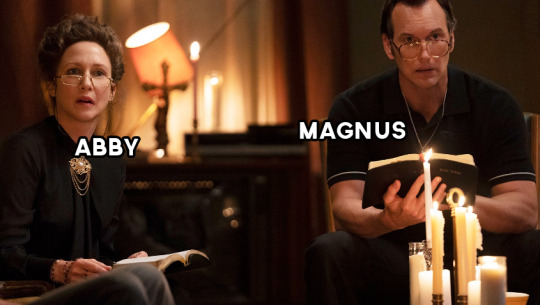
my running theory was that the ghost was commander wake aka allegedly gideon's mom (none of that is in any way confirmed yet)
and ortus was about to say something
I said it might be poetry and, guess what?
I WAS RIGHT
you go, ortus, you recite that poetry
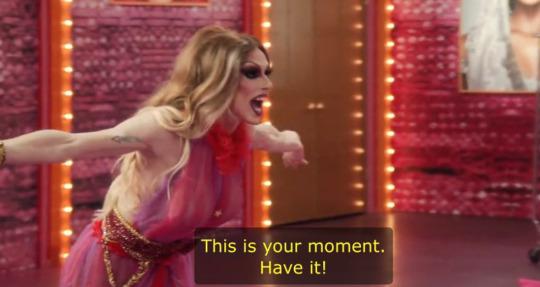
abby apparently takes that as a cue to do something and thinks ortus has too much faith in her
but ortus trusts her, there's a lot of polycule moments in this one
the sleeper/waker/slasher allegedly gideon's mom unconfirmed absolutely does not give a fuck about any of this, she's slaying them all with her "baggy orange suit and gun collection"
I need the suit to look like this so bad
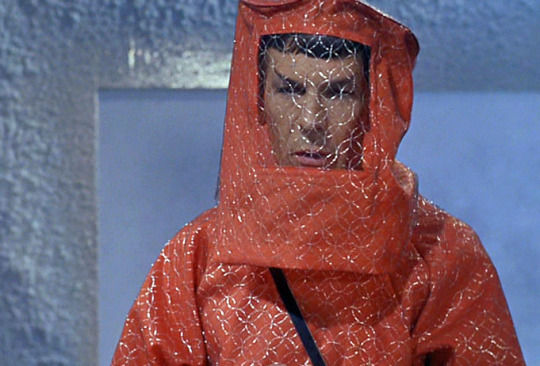
harrow starts making constructs but killer bae starts turning them into ash in seconds
I mean, I know we need harrow to live and this woman is not supporting that idea but damn, she looks cool af
if you fought the emperor at any given point, amanda (I'm calling her amanda for now, I'll elaborate later) how did you lose?????
ortus is harmed, so harrow has to continue with the recitation in his place
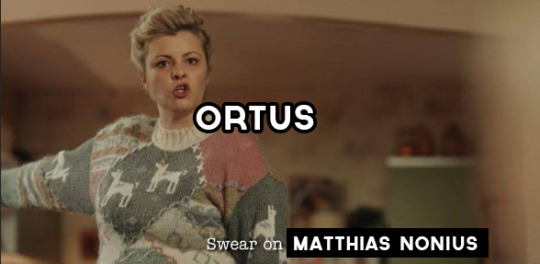
so harrow continues to recite the nonius poetry, while abby chants in the background and everyone else waits while bleeding
it's a very involved artistic performance that we've got going on over here in canaan au river bubble
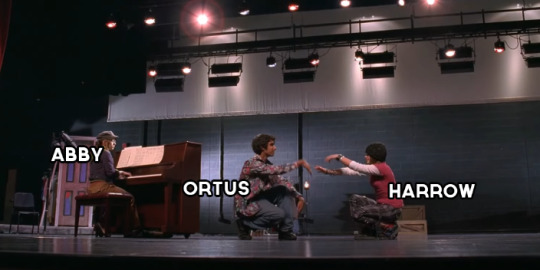
sleeper/waker/slasher/alleged commander wake alleged gideon's mom aka amanda (according to me) shoots harrowcita
but then abby is lifted in blue flames and seems to be holding an invisible book and everything gets all vib-ey
these are the exact vibes I'm picturing
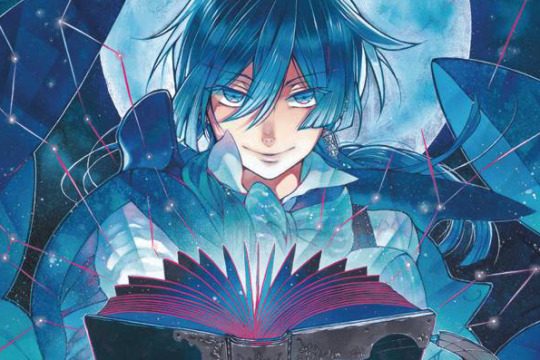
(not because I have a print of that in my room)
so harrowcita is saved from getting shot in the head by a man with the Ninth uniform and a very stellar use of the blade
AND YOU WOULDN'T BELIEVE WHO IT IS
IT'S ORTUS'S BLORBO FROM HIS SHOWS!!!!!!!!
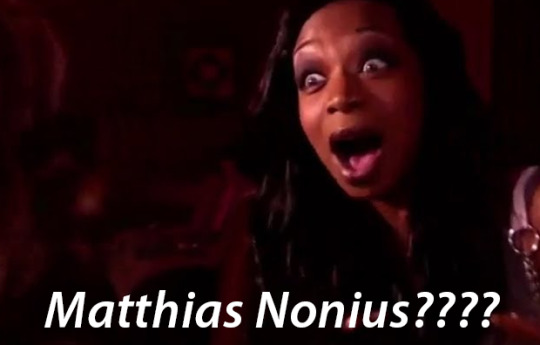
matthias nonius is a short king who is surprised to be speaking in meter but is very happy to be here to defend the Reverend Daughter and fight like an expert killing machine
WHERE WAS ALL THIS FIGHTING POWER WHEN IT CAME TO KILLING THE EMPEROR
but not only is matthias nonius 10/10 at fighting (as advertised), the shrine ortus has in his head for him is helping to even the playing field with the waker/sleeper/alleged commander
she can't shoot anymore
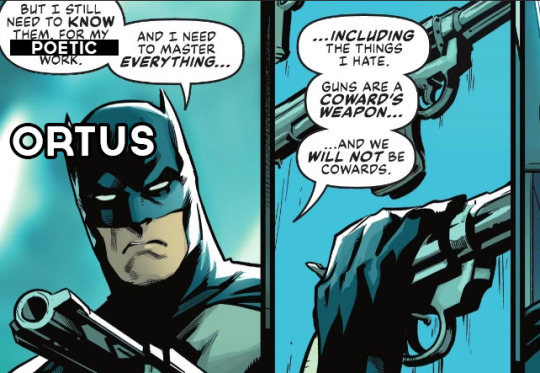
"I killed wizard's filth like you all my life. I killed them with guns, and bombs, and knives, and gas, and when I didn't have any of those I just got in real close and put my thumbs through their fucking eyes. You can flick that little skewer around all you like, boy. I'll choke you with it"
SHE'S INTENSE, we can be certain that the Harrow Only Notes were hers
"I certainly hope you're a fighter. God knows you're not a debater"
you guys I'm a certified mati nonius fan right now
ortus is drawing little hearts in his poetry book and writing Ortus Nonius in it
"If all of her cavaliers were this excited for death, she was definitely the problem"
they just love you too much, harrowcita
so mati nonius and waker/sleeper/alleged commander have the most intense and entertaining fight ever
because lyctor fights are weak and boring
but this, this is cinema
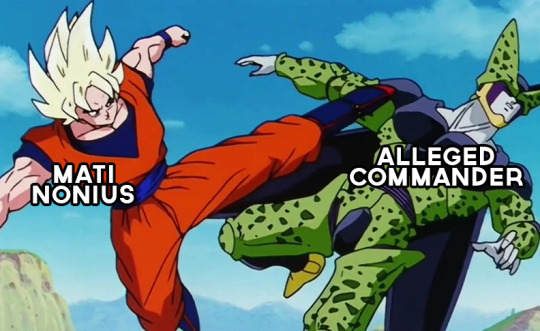
harrow thinks that, if gideon had been there, she would have loved the fight but also she'd be terrible at running commentary of it
I disagree, gideon's running commentary is one of the things that keep us together as a society
"In life she must have had few, if any, equals. Her people—whoever they had been—must have cherished her as their finest champion."
gideon got some great fighting genes from all around, if my theories prove right
I mean, if her people are the people I'm thinking, they still have posters of her, so she must have been a big deal before she crashed in the ninth
SAD SHE DIDN'T KILL DR REVEREND EMPEROR JOHN THOUGH
BUT THERE'S STILL TIME FOR THAT
LIKE AN HOUR
harrow says mati nonius is "a poem" which is very nice of her to say
you go, short king
there's a lot of blood happening, also, which could be encouraging, since before this, the waker/sleeper/alleged commander wasn't bleeding at all
the room changes to become a ninth chamber and alleged commander changes clothes from the star trek orange suit to a different yet still orange getup and a golden mask
ortus's shrine in his head built for mati nonius is rewriting the possession
because nothing can pull you from the depths of despair as fast as your favorite blorbo
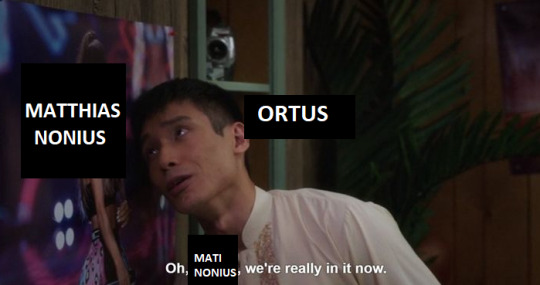
"My master in life was revenge, my mission is one of—Goddamn it, I'm not going to start talking like this"
more points for the gideon's mom theory
protozoa and ortus are now communicating telepathically, they are starting to put aside their rivalry and finding out they have a lot in common
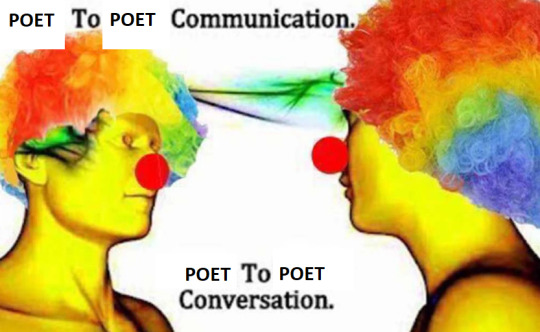
enemies to friends to lovers speedrun
mati nonius loses his sword and goes feral
protozoa throws his cunty seventh rapier towards him, mati nonius catches it and ends the waker/sleeper/alleged commander
it all looked incredibly cool
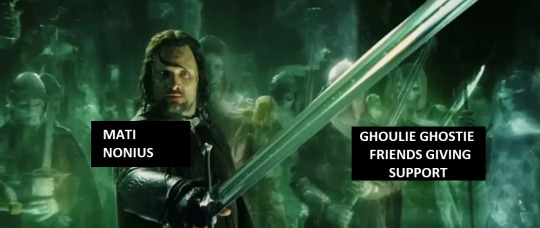
once the enemy is partially defeated (let's remember she's supposedly tethered to an object that I think is gideon's sword), the body horror starts falling from the walls
it's described as "sausages flung from a height" which is...quite the thing
like, I get what that sounds like, but also, maybe I didn't wanna know
harrow looks at the face of the waker/sleeper/alleged commander and says it's the woman from the poster of the shuttle
YASSSS GETTING CLOSER TO MY THEORY
like, I still don't know if the woman from the poster is commander wake or if she is indeed gideon's mom, but I'm going all in on this theory
now we have a little intermission in which everyone is waxing poetic about everyone else
this is the canaan house we always wanted to see
protozoa is giving heart eyes to mati nonius, mati is giving respects to harrow, ortus is saying he wants to write a poem about abby, magnus is telling ortus not to flirt with his wife as a joke but ortus looks mortified
and abby says ortus did most of the job but she also points out she corrected some of his spelling
which might have been the biggest mistake in magnus's and abby's lives because they just destroyed their polycule
you can't treat the ninth like that, fifth, they take it personally
but ortus is vindicated because his oshi, his favorite blorbo, his biggest hero, tells him nice things
harrowcita goes to check on the ghost corpse of the waker/sleeper/alleged commander and finds some tags
one of which says AWAKE
I THINK THAT'S MAYBE A. WAKE
AS IN COMMANDER WAKE
and I'm naming her amanda, as previously established
it would go well with the ancient tumblr meme
the prophecy
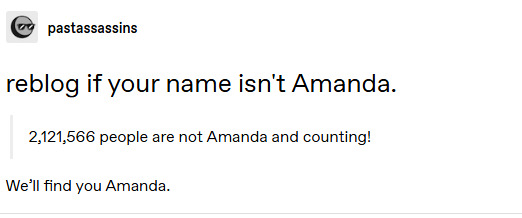
sure hope this isn't the famous alecto everyone keeps mentioning because it'd ruin my prophecy
abby tells harrow the only way to get rid of her for good is to destroy the object to which she's tethered to
which I suspect might be gideon's sword, so fuck all this
we're meant to lose gideon and her sword??? absolutely not
let the woman kill the emperor instead
ALSO
surprise! mati nonius is besties with gideon the first
now, for someone who was sold out to be super serious and not an extrovert, gideon the first knows EVERYONE
he knows mati nonius, he probably also knows, to some degree of intimacy yet undetermined, the commander, he might be somewhat related to our gideon
the man is everywhere
basically, mati nonius and gideon the first had the same speedrun friendship that gideon had with camilla
they fought each other once and one of them thought "you're friend-shaped :) "
so, mati nonius is willing to go help gideon the first with the beast
because, as we have previously seen, no other lyctor is currently doing what they were supposed to
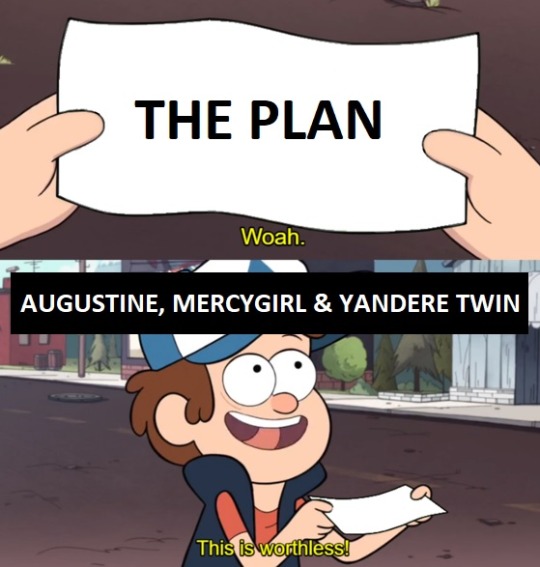
so, ortus says he'll go with mati to help gideon the first
abby and magnus want him to go with them to be forever happy in their polycule, but it's too late
abby has insulted his spelling and magnus has made him feel uncomfy with his joke about the flirting
HOWEVER protozoa has told him he actually likes him AND has quoted poetry HE WROTE HIMSELF
enemies to friends to lovers to soulmates
martita, who was there the whole time, ties her sword to her broken hand and says she'll go with them
martita is actually cool for a second house person
judith, you didn't deserve her
NOW THERE'S A PROBLEM
A BIG ONE
if harrow doesn't go back to her body, she'll get lost and lose her mind in the river
if she does, though, she's gonna kill gideon for good
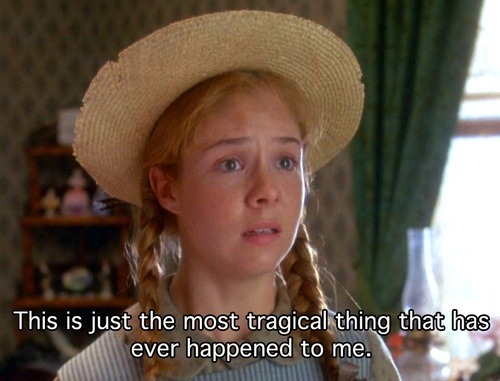
harrowcita has a crisis and a breakdown
(and also stops for just a second to remember gideon rolling up her sleeves)
magnus compares the situation to a breakup he had with abby one time, which I don't think really encompasses the gravity of this situation, but ok magnus, it sure is similar
I mean, the breaking up part maybe but the level of gravity of the situation? idk man
I'm sure breaking up with abby felt this dramatic to you but...it's a little different
abby and magnus leave, telling harrowcita that jeanne said to tell gideon "hi" if harrow sees her first
which is super cute of the kid tbh
so, that leaves us with real!dulcinea
who is still here because
1) much like her lyctor counterpart, is very resistant to dying for good
2) she's determined to get vanished into nothingness and disappear into the very essence of existence, which I think sounds pretty cool
"The Seventh says nothingness is the only truly beautiful thing anyway, so nyah"

3) also: "Actually, I've got something to tell you"
I SURE HOPE IT IS A WAY TO SAVE BOTH GIDEON'S AND HARROW'S LIVES
FINGERS CROSSED
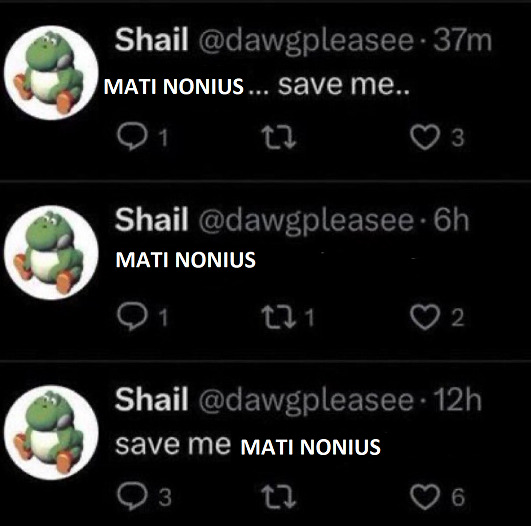
and that's it for this chapter!!!! next time, I'm expecting more gideon and yandere twin antics!!!
77 notes
·
View notes
Text
Late Night Comfort
(one shot)

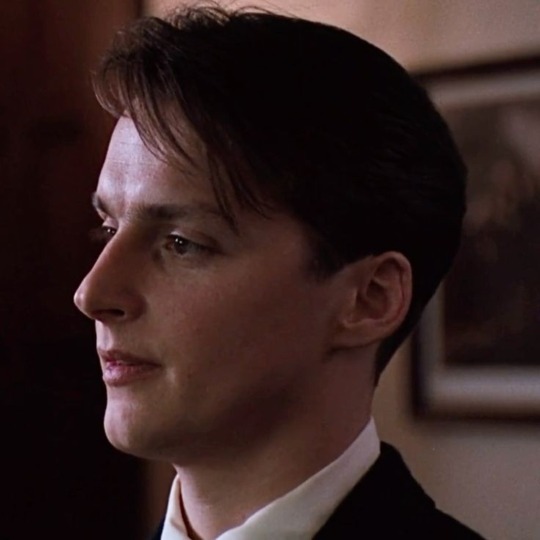
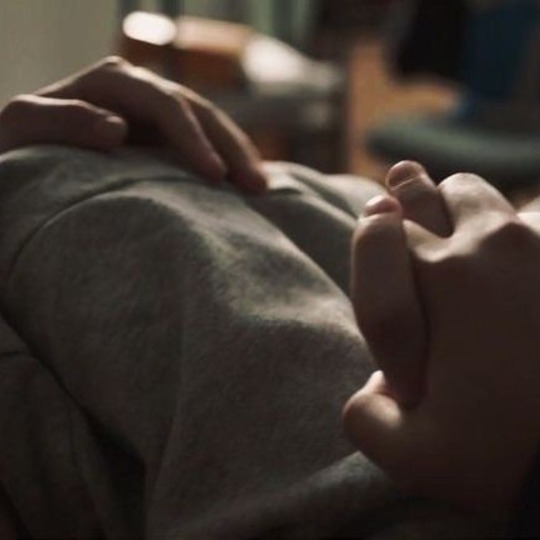

♡ -> Charlie Dalton x Reader
Summary: Everything has changed since the loss of a good friend. Everything is quieter, silent suffering that can't be contained, at least not for Charlie, who seeks comfort at a very late hour of the night.
-> Content & warnings: female reader, fluff, angst, love confession, narrated in 1st person, DPS spoilers!, secrets feelings, girls are allowed on Wellton, reader is part of the boys group
-> word count: 1.7k
-> (a/n): hii, a few days ago I watched DPS, and let me tell you that I NEED Charlie Dalton, he's so cute and sassy I just love him, the movie is so so amazing and beautiful, absolute cinema, so I figured I could write a one shot for my baby ♡♡♡
Sorry in advance if there are some misspelled words, bad grammar/phrases,etc. English is not my first language!!
Divider by @/anitalenia

It's been a week since Neil's passing. The atmosphere at Wellton isn't the same anymore, everything is quieter, and without Professor Keating our poetry class lacks meaning and passion. We stopped learning anything really, there is no class like Mr Keating's classes.
The boys, the whole group also changed, it's clear that we are all dealing and coping with Neil's death.
I sometimes go back to the Indian cave where all our “dead poets society” meetings were. But every time I go back I swear it feels colder than before, wetter than before and sadder each time. To think back and remember how we used to all laugh here, how we talked and listened, how we bounded like we have never before, and how charlie played the saxophone in a way that warmed my soul.
Now there's pure silence, and our laughs are trapped in the walls, faint whispers of all the poetry that has been read inside this dark cave.
Inside the cave I sometimes encountered the other boys, and usually they were always the same ones, pitts, knox, meeks, charlie and of course me; at the end the ones who were still going to the cave wanted the same, to revive the feeling of those old days, to feel the nostalgia of what could've been if something like the loss of a friend didn't happen.
I close my trigonometry study books as I prepare to go to bed, I get in the soft winter blankets my grandma crocheted herself, I lay my head on the pillows and turn my body to turn off the lamp I have next to my bed. I watch the ceiling for a while trying to fall asleep, and I eventually do.
A small and hesitant knock on my door, I tap the lamp again to turn it on and I look in complete silence in the direction that the sound came from, i wait and another knock is heard again, I glance at the clock that marks exactly 2:00 am and with a confused expression on my face I put on my slippers and get off the bed to open the door.
I open it, and I see Charlie standing there, with his usual light blue pajamas, I focus my eyes on his face, he looks tired and sad, but at the same time he's glad to see me.
“Hey, can..can I come in?” He is the first to speak and he does it almost in a whisper as he doesn't want the whole corridor to hear. He looks at me the whole time, and I cannot handle the way his eyes remind me of the ones of a puppy.
I nod and he comes in, I close the door with my hands behind my back to get a look of the situation in front of me, it worries me to see him like this.
“What happened chars?” I grab his hand softly and I guide him to my bed so we can sit and talk, as I do my heart beats loud, I can't contain and I can't deny anymore the way he always makes me feel when we're this close. I almost feel guilty to be thinking like this when he looks like he is on the verge of tears.
“I can't sleep, I keep seeing this images, this memories when I close my eyes, I just, I need someone to be here next to me” he is open about his thoughts with me, he's always been, whatever it is he's always been honest with me and straight to the point, and that is how I would describe our relationship.
“Do you want to stay again? you can rest here, we can talk if you want” I suggest to him while I look at the floor and then at him, he was already looking at me, the glimmer of the lamp paints the room of a warm yellow, and in his eyes it shines in the form of a small star, they are watery and a little red on the sides, but he looks dreamy under this light.
He nods in response, so I get up off the bed and grab some blankets from the top drawer of my wardrobe. I started making the bed that's on the right of the room, since I was not assigned with a roommate that bed is always empty.
In the walls I see my big shadow making the bed for him, I feel how he is looking at me the whole time, I'm nervous just thinking about it, even though it's not the first time he's going to sleep in the same room as me.
Once I finished making it he gets up my bed and walks towards me as I go back to my own bed, I get inside the blankets again, I place my hand on my cheek to look at him and how he gets on the bed, he only looks at the ceiling, i look at his side profile and i trace his features in my mind, I decide to break the ice.
“What's on your mind that doesn't let you sleep?” he turns his head and looks at me, he matches my current position and turns his body so he is completely facing me.
“Neil” he says as I expected, sighing as he says his name, even from this distance of the room I can see how a tear began to fall and followed the bridge of his nose.
I grab the side of my blanket and I extend it in the air, opening it as a way of telling him that he is welcome to come and lay down next to me, he gets up when he notices and scoops next to me on my bed, his chest is warm but his feet are cold.
My back touches the wall as I try to make more space for the both of us, but we are still very close to each other. I turn my body to look at him, he does the same.
Another tear falls from his eyes as we stay in silence, with my thumb I hesitate but I get on time to dry it before it reaches his lips. His expression changed slightly when I did, his eyes grew a little bit bigger, he breathed deeply and his lips parted slowly from each other.
“Am I so in love with you, to even notice the smallest details of your actions, charlie?” I thought to myself at that very moment. I very much knew the answer.
It's not the first time we seek comfort from each other, that we seek our company for various reasons. But tonight, tonight is different. He is different.
I've never seen him cry like this in front of me, I've never seen him so vulnerable and sensitive next to me. We did see each other cry, but from laughter or when the whole group was there, tonight there's privacy, there's an intimate moment, there is a cozy and comforting feeling between us.
I know he feels it too, because he is leaning towards me even more, he looks for my touch as he rests his head on the creek of my neck, from a moment to another he grips the fabric of my pajama shirt, he snuggles his face deeper in my neck and I start feeling the wetness of his tears before I hear his pain.
I stay still for a moment, I can hear how my heart beats louder in my ears, and how he Is choking on his own sadness. With my left hand I caress his cheek, his hair, and his ear. He starts to calm up with my touch, he stops crying but he still grabs the side of my shirt in the most innocent way.
I think of him when we were kids.
“I'm sorry, I didn't expect to explode like that” he says, still buried in my neck, he's embarrassed and his words almost come out as a mumble.
“don't be sorry, it seems like you needed to cry out loud so you did” he raises his head and i look at him, smiling without teeth.
“Do you feel better?” I speak again
“yeah I do actually, thank you” He lets go of my shirt and accommodates his body so that his head rests on my pillow, I do the same, and we both look at each other for a moment.
“you're very special to me” He says out of nowhere, making me blush, not only is he looking at me like he is searching in the depth of my soul but he also says something like this.
“I'm going to explode.” I say in my head
“you're very special to me too, Charlie, you always were.” I respond, I fear that my body keeps pushing me to finally confess to him, it's like a sudden impulse, but is it really the moment?
I keep looking at him, going from one eye to another, I try to search for me in them, I see all of the memories I have of him, the every moment that he made me fall in love with him even more, and in that very moment I find it, I find the bravery to follow this sudden impulse.
Carpe diem.
I get closer and I kiss him right on the lips, I close my eyes and I make it the faster I can to not regret it after. I taste the salt from his dry tears. I pull apart once the impulse is gone from my body and I go back to being embarrassed.
I see how he slowly opens his eyes, he looks at me, his pupils are dilated and he smirks before grabbing the back of my head with his hand and pulling me closer again.
The kiss he gives me is deeper, like he waited a long time to do this, like he imagined every single detail the same way as I did.
We separate, he places his forehead on mine as I listen to how he breathes.
“I like you, I like you so much” he says desperately, like if he was holding these words on the back of his tongue, like it was burning him every minute that passed without being able to say it.
“I like you to chars, a lot” I look up at him as I separate our foreheads, he looks beautiful as always.
I never imagined that this night could end up like this.

Thank you for reading!
#charlie dalton x reader#dps x reader#charlie dalton#dps fanfiction#dead poets society x reader#dead poets society#fanfiction#fluff
61 notes
·
View notes
Text
The Anti-Bojack: Anti-Intellectualism and the Death of Substance
In the blog essay “Staging Philosophy: the relationship between philosophy and drama”, Kristen Gjesdal opines on the home of philosophy. Many today would consider philosophy a relic of a bygone era with names such as Keikegaard, Voltaire, and Neitzsche. Many don’t know, however, of the close relationship philosophy has always held with the arts. Gjesdal mentions Ibsen in the article, discussing how many playwrights of the time were avid students of philosophy and how many philosophers regarded the arts highly. Nietzsche spoke of social leaders, specifically the religious leaders of his day in Beyond Good and Evil when he wrote, “Men, not great enough, nor hard enough, to be entitled as artists to take part in fashioning man.” Frankly denouncing the power and influence held by the religious men which he felt was more appropriately left in the hands of artists. In fact, Nietzche considered art the definition of culture and hence why he says that artists are the ones who should be responsible for shaping society and defining what it means to be “man”. As such, the expressions of art, poetry to cinema, is a definition of man and inherently a philosophy.
Bojack Horseman is an openly philosophical series that plays with existentialist schools of thought. Having liked several tweets endorsing the comparison of her work to that of Raphael Bob-Waksberg, Vivienne Medrano demands her work be valued the same way. From being favorably compared to Bojack Horseman to being praised as the “Anti-Bojack”. Which begs to question, what does that even mean? First let’s discuss the Philosophy behind Bojack Horseman, then compare the tweets Medrano liked and her series to that of Bojack directly, and then study the overlapping themes and why Medrano’s style of writing makes her storytelling a mockery to the art.
Existentialism in particular has been the darling of the theater for about the last 150 years, though generally ridiculed by “proper” society. For a philosopher to be labeled a nihilist or existentialist was often a denouncement of their school of thought, often for their general rejection of fundamental social structures like ethics. In 1942, writer Albert Camus published his essay The Myth of Sisyphus, rebranding traditional existentialist concepts as Absurd philosophy.
Camus begins his work poised with the question of suicide and whether life is worth living at all. He argues that life is inherently meaningless, an idea originating with Kierkegaard, but while the latter sided with finding purpose in constitutions like religion, Camus argues that religion itself is a philosophical suicide. In the Routledge encyclopedia of philosophy by Charles Guignon, he writes of the criticisms levied against existential and absurdist philosophies in a society awash in moralist anti-intellectualism. He opens this section by saying, “Existentialism has been criticized from a number of different angles. One line of criticism holds that the emphasis on individual freedom and the rejection of absolutes in existentialism tends to undermine ethics; by suggesting that everyday life is ‘absurd’ and by denying the existence of fixed, binding principles for evaluating our actions, existentialists promote an ‘anything-goes’ view of freedom that exacerbates the nihilism already present in contemporary life.” Which comes from this negative misreading of nihilism.
In their video Nihilism: Are We Missing the Point, youtuber Michael Burns of Wisecrack tells an anecdote of his time in grad school where he paraphrases his professor as saying, “This idea of the constant misreadings of Nietzsche’s writings on Nihilism leads to, his words, angry seventeen-year-old atheists.” Which tends to be the issue when discussing concepts such as nihilism, existentialism and absurdist philosophy. Nietzsche, the credited father of the school of thought, is often taken out of context or his views distorted by society’s sensibilities. For one, the quote given earlier extends further into a condemnation of religion by saying, “Such men, with their "equality before God," have hitherto swayed the destiny of Europe; until at last a dwarfed, almost ludicrous species has been produced, a gregarious animal, something obliging, sickly, mediocre, the European of the present day.” Which many an angry seventeen-year-old and moralist has seen as an endorsement of the might-is-right philosophy that nihilism is credited with.
To a lesser extent, Camus writes in The Myth, “I must say what counts is not the best living, but the most living”. It feels like it should be rather straightforward then, the concept of the thought. More equals better, and Camus practically says as much when he later writes “Why should it be essential to love rarely in order to love much?” However, if one follows the first quote to its natural conclusion, he continues, “The most living; in the broadest sense, that rule means nothing. It calls for definition.” His wording may come off confusing as the essay is translated and the theories involved are dense, but Camus clarifies that “most” could mean the sheer number of experiences or the depth of the experience. He is not saying one or the other is the correct answer, but that both are equally valid ways to live one’s life. The focus, then, is not on directing anyone how they should live, but in the manner they should do so. He says, “It is not up to me to wonder if this is vulgar or revolting, elegant or deplorable … Suppose that living in this way were not honorable, then true propriety would command me to be dishonorable.”
Camus, and even Nietzsche, argue that truth is the only ultimate value. It throws back the moralist dilemma by arguing that living to a code of ethics or values when one is not truly that sort of person is to live reprehensibly. Better is it to live authentically “without appeal” as Camus says, than it is to live the lie of following the rules.
Thomas Polzler from the University of Graz in Austria wrote a 2014 article titled “Absurdism as Self-Help: Resolving an Essential Inconsistency with Camus’s Early Philosophy”. Personally, I fundamentally and adamantly disagree with his assessment that there is any sort of inconsistency in Camus’s writings. Camus’s books of The Stranger, The Plague, and The Fall are not inherently inconsistent, but depict his philosophy in layers.
Like water painting, Camus starts with a thin veneer of color, a loose and almost detached protagonist in Meursault from The Stranger. He is a man aware of the absurd as an individual, the story maintaining the focus of a man living aware his life means nothing and thus seems to have an almost neurodivergent disinterested in the world beyond himself. What he feels in the moment is all that matters, so when he commits murder out of feeling uncomfortable from the heat of the sun and the painful blinding of the light, he is then juxtaposed with the ethical society he exists simultaneously within and outside of. Meursault is held up as a sociopath for not wishing to see his mother’s body the night before her funeral and smoking by her coffin. Because he does not cry at her passing, he is deemed a danger to society. Because he goes on a date to a comedy picture the day after, he is denounced as a menace. None of which has anything to do with the man he killed. The trial highlights the absurdity of ethical society and how the moralists demand the appearance of values over actually having them.
In fact, the trial of Meursault closely resembles that of Bojack and Sarah Lynn. The end of season 3, Bojack and Sarah Lynn go on a cross-country drug-fuelled bender to apologize to people Bojack has hurt in the past, stopping at the Griffith Observatory where Bojack has a profound revelation. He talks about living in the moment and how neither the past or future really matters at all. What you did and your legacy don’t matter if you cannot exist now. It is this moment that he realizes Sarah Lynn is not responding. It isn't until season 6 that it is shown that Bojack waited before calling the police and thus played a hand in Sarah Lynn's death. He is taken to civil court by Sarah Lynn's mother and step-father and made to pay them a fine for his involvement. However, is it really justice when Sarah Lynn's mother exploited her in the business and never once supported Sarah Lynn for what she wanted and what her dreams were, or even just who she was? Can one argue that it is justice when Sarah Lynn was sexually abused by her step-father throughout her childhood? Yes, Bojack does have responsibility in Sarah Lynn's death, but so do her parents. The absurdity of it all being that in no way could there ever be justice for Sarah Lynn.
Brief mental health sidebar. While I have to expressly disagree with Polzler’s reasoning, I do agree with his conclusion. Philosophy and especially Absurd existentialism are powerful tools in the journey to self improvement. It is both the line from Bojack where Diane says "That's the thing. I don't think I believe in 'deep down'. I kind of think all you are is just the things that you do." And Dr. Wong in Rick and Morty when she says, “You seem to alternate between viewing your own mind as an unstoppable force and as an inescapable curse. And I think it is because the only truly unapproachable concept for you is that it's your mind within your control … You are the master of your universe.”
It may be shocking to know that Medrano was not a fan of Dr. Wong, considering the scene all about telling and not showing Rick’s problems. However, this is after two and a half seasons of witnessing Rick’s shortcomings and Dr. Wong is not telling Rick’s problems, but rather identifying the solution. In both the words of Diane and Dr. Wong, who we are, comes down to the choices we make. There is no moral argument being made with either of these comments. Bojack asked Diane to tell him that he’s actually a good person deep down. That he means to be good, that despite his actions he doesn’t want to hurt anyone and that his bad behavior is the fault of his emotionally unavailable and narcissistic parents. So really, he isn’t a bad person. Whereas Dr. Wong calls out Rick’s behavior as a choice because Rick knows he is making these choices.
The difference between Rick and Bojack is the level of personal awareness and responsibility. Rick knows he has the power to change, but simultaneously so miserable but is so afraid of change that he turns himself into a literal pickle and risks his own death over confronting his own choice to stay the way he is. It is easier for him to justify his lack of trying by simply claiming this is just what it means to be as smart as he is. Whereas Bojack feels helpless. Bojack was not set up for success as a child, his success was never validated by his mother and thus he never valued himself, and every time he tries to change he has no internal fortitude to keep from backsliding at the first sign of defeat. Rick knows everything that is making him miserable is himself. Bojack externalizes his misery and thus also externalizes the solution to his problems, which is why he lets himself return to square one whenever things don’t go his way.
Absurdism is the recognition that life is meaningless and thus we have two choices: Live or die. But these concepts are not so straightforward when discussed. To live, in Camus’s philosophy, is to live authentically to oneself. That may sound like Rick’s situation of accepting things as they are, but that is only true in the case of the individual genuinely wanting to be that way. Authenticity is a dichotomy consisting of both how we behave and how we feel. In the case of Rick he lies, cheats, manipulates, and behaves cruelly towards his family. However, it is implied and later revealed that Rick genuinely cares about his family, but is too afraid of experiencing loss to really let them in. So he’s abusive and insulting, keeping his family at an emotional distance that keeps them around, but never too close, making Rick miserable. He really wants his family, so his feelings are at odds with his behavior. So in reality, him claiming “this is just how things are/who I am” is just as weak an excuse and removes agency over oneself as Bojack saying “It’s because my mother was never there for me.”
The actions both Rick and Bojack partake in are what Camus would call a philosophical suicide. Concisely put, to commit a philosophical suicide is to remove one’s sense of agency in their own life. How can one claim to be living when they have no effect on anything including themselves? You would exist in a void no different than a dreamless sleep. Your actions are meaningless, your thoughts are meaningless, your feelings are meaningless because you are a passenger to the act of living. Everything else has power, everyone else can influence you, so you may as well be nothing. Camus includes religion in this section of his philosophy, as living for something other than yourself is the same as not living at all. And this encompasses Ethics.
There is a massive difference between being kind because you are supposed to, and being kind because you want to. This delves further into living inauthentically and how that mere act alone results in misery. Even if one is to behave in a way deemed “right” without making the choice, they will inevitably become resentful. There is no such thing as faking it until you make it. One has to actively choose and change themselves on a fundamental level to find happiness, and that takes work. Just as Dr. Wong says, “It’s just work. And the bottom line is some people are okay going to work and some people, well some people would rather die.”
Which gets to the main point.
Medrano’s liking of a series of tweets calling Blitzo the Anti-Bojack has both infuriated and confused me. I suppose that I should be embarrassed at the latter since it's obvious both Vivienne and her fans lack basic media literacy. It’s actually rather spectacular just how badly they misrepresent the situation of the characters in the narrative. I can only break this down comment by comment.
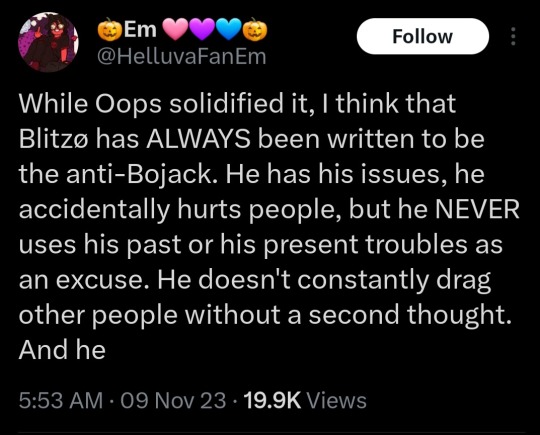
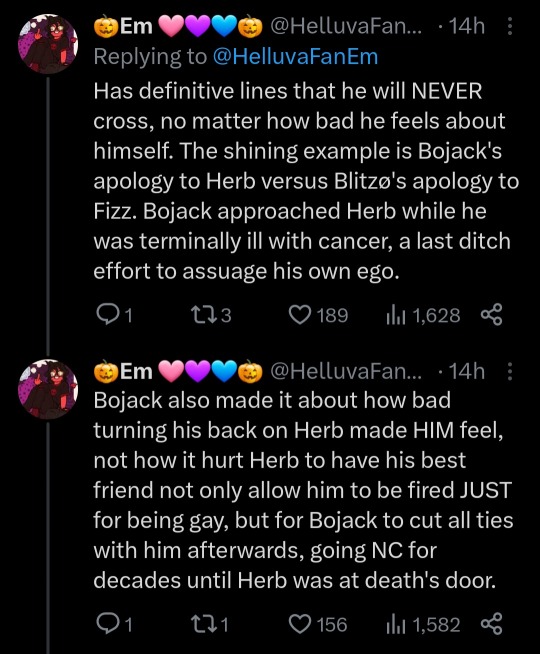
For one, Bojack’s entire character is that he doesn’t intentionally hurt others. He has his reasons that fundamentally comes from a weak sense of self associated with a child who never had the emotional support he needed growing up. Those aren’t excuses, those are the reasons. Bojack has an unhealed inner child who wants to be a good guy, but he is so caught up in his self-loathing and resentment that he doesn’t do anything about that inner child. Instead he indulges these immature emotions through self medicating with drugs and alcohol, lashing out, promiscuity, and careless spending. These are the symptoms of the problem, the problem does lie in past trauma. The issue is Bojack doesn’t see the solution as himself, but someone or something else. In my post comparing Bojack and Todd’s relationship to Blitz and Moxxie, I pointed out how Bojack and Blitz treat their “closest friends” exactly the same by verbally abusing them and tearing down their abilities. While not always consciously intentional for Bojack, it is to keep Todd feeling codependent on Bojack and thus never leaving him which is abusive and manipulative. For Blitz, the narrative says it's because he is aware of his behaviour and is intentionally pushing Moxxie to be better, which is abusive and manipulative.
My point herein being that these are the same people. There is no Anti-Bojack happening here. If anything, Blitz is more malicious in his abuse seeing as he appears actively aware and intentional in how he mistreats Moxxie. Bojack is abusive towards Todd, but in a way that is a reflection of Bojack. And the series acknowledges how Bojack's inability to be alone actively harms his other relationships. Not just Todd.
In one way, however, Blitz absolutely is the Anti-Bojack. Blitz externalizes the source of his behavior to a character failing on Moxxie's part. And the series reaffirms and justifies Blitz's abuse as okay.
The other misconception of this post is thinking that an explanation is an excuse. Creative Screenwriting did an interview in 2019 with Raphael Bob-Waksberg’s process and philosophy of writing Bojack Horseman, quoting him for the title of the article, “Characters should be understandable in their vulnerabilities.” What Medrano’s fans fail to do, fundamentally, is understand. Their opinions and twitter orations are so barren of understanding that one must ask if they simply choose to ignore what does not serve their narrative or if they really are just incapable of comprehension.
They see Blitz’s mother’s death as a reason for his attitude more than his behavior. His behavior then necessitates that it needs to be excusable. As such, Blitz cannot actually make mistakes. Things happen by chance rather than a deliberate choice on any of the characters’ behalf. The fire in Oops wasn’t a mistake made by Blitz, if it is anyone’s mistake, it is the no-named imp who lit the candle before getting to the room. Blitz didn’t intend to bump the other performer, he just happened to turn at that moment. His mistake, then, is one that only makes sense on a metanarrative aspect. His mistake was deciding not to confess his feelings to Fizz. Which… no. As novel as the concept of the butterfly effect was in 2015, the fundamental nature of something inconsequential being attributed to a disaster negates blame. No one is going to blame the butterfly for a hurricane. Similarly, Blitz’s decision to not confess has nothing to do with the fire, in fact the fire itself is not even his accident. His contribution begins and ends with accidentally bumping the other imp; a situation that would have been entirely harmless if not for another character’s unrelated decision made off-screen.
Additionally, Blitz is a heinously insufferable individual who has been nothing but insulting and abusive to his “friend” throughout the series. He sexually abuses Moxxie in Harvest Moon by touching his penis against his will. He threatens to rape Moxxie and Millie in Murder Family. Blitz humiliates Moxxie through emasculation by masculinizing Millie over Moxxie, mocking Moxxie’s anatomy through his weight and genital size, and degrading Moxxie’s hobbies and abilities. Often without any prompting whatsoever and for Blitz’s own personal enjoyment. Blitz simply is a malicious individual, and at one point the series seemed to know that. The issue isn’t that Blitz is an awful person, it’s the lack of acknowledging that fact. The fans and Medrano conveniently ignore who this character is and what he has done to justify him instead of seeking to understand him. This is a running theme throughout the show.
I also briefly compared the scene in Oops to Herb and Bojack in this post, but I didn’t focus so much on the characters and more the metanarrative reason why Bojack worked and Helluva Boss didn’t.
Here, let’s look at why Bojack went to see Herb: Because Herb told him to. Unlike the scenario between Fizz and Blitz where they didn’t see each other for fifteen years and then conveniently run into each other and just so happen to be spotted by Crimson and Striker who, for some reason, know all about Fizz and Ozzie being a thing and they just keep Blitz around because … he’s the main character. Sure, one could argue both Crimson and Striker have a personal thing against Blitz, makes you wonder why they didn’t, you know, do anything to him? No torture or revenge of any kind, he’s just there now. Conveniently tied up and kept with Fizz instead of literally anything else they could have done with him. There is no internal logic to the characters as to why things turn out this way. As seen in the Mammon episode, it's a metanarrative compulsion to make sure Blitz is in every episode regardless of whether it makes sense or goes anywhere, or not.
Another sidebar, but the fact that so much of the series is not able to be explained within the narrative and requires an understanding of how Medrano and her team formulate a script is a huge issue. It removes the ability to properly dissect the characters as individual people and necessitates a reading of them that is how Medrano wants the audience to think about them. When it comes to the character dissections, it is effectively impossible to have a complete or coherent reading in regards to the literary philosophy of the Death of the Author. You have no story or character if you remove Medrano. The world as a whole completely falls apart unless you inject it with her metacommentary and narrative intention like one would preserve a corpse through glycerin. There is absolutely no substance here. And the longer she goes on, trying to compile the whole show into a coherent narrative of its own is like building a skeleton with a human ribcage, an ostrich spine, an elephant skull and the lower half of a barbie doll.
Bojack calls Herb after finding out he is dying from cancer, Herb tells Bojack to come visit him. He refuses to talk to Bojack any other way, and Bojack is compelled to go by his guilt, not ego. Herb calling him to his house obliterates Bojack’s ego, this is Herb’s home and he is the one being summoned. This is where Herb has the most power compared to, say, over the phone. This is not only a move of superiority on Herb’s part, but an act of submission on Bojack’s. Herb forces Bojack to come to him. Once again, this is what power dynamics look like. But, despite the resentment and awkward bitterness, he does want to see Bojack.
I don’t know how many times I can articulate this. Herb is the one in control and he is the one who wants to see Bojack and he is the one calling the shots. Not at all comparable to Fizz being kidnapped, forced to interact with Blitz and then wholly reliant on him due to the narrative in order to facilitate this forced reconciliation. Herb and Bojack are people with complex feelings and agendas. Blitz and Fizz are two dolls being smashed together and held in place by the will of a childish god.
Second, the reason Bojack calls Herb is because he feels guilty, not for abandoning Herb but because he betrayed Herb. He told Herb he would stand with him and walk off the show if they tried to fire his friend, but according to Bojack, he was a coward and didn’t keep his word. He feels guilt for that, he regrets it. But when he apologizes to Herb for it, Herb corrects him. It isn’t because Bojack didn’t keep his word, like the horse man thought, it was because he thought the betrayal was more important than their friendship.
He’s a coward, but not for staying on Horsing Around. He’s a coward because he didn’t believe in their friendship. They were together for years and Herb thought that meant something, but Bojack avoiding Herb and never reaching out to him showed how little their friendship meant to him. And it wasn’t because Bojack didn’t care, Herb knows that. And that fact is necessary to understanding the sequence. Bojack didn’t value the friendship because he thought he was valueless. He avoided Herb because he thought Herb would never forgive him, because that is how little Bojack thinks of himself. Him calling Herb is the active display of him still not forgiving himself, so he needs Herb to do it for him. And Herb knows all of this.
“You know what your problem is? You wanna think of yourself as the good guy. Well, I know you better than anyone else and I can tell you that you're not. In fact, you'd probably sleep a lot better at night if you just admitted to yourself that you're a selfish goddamn coward, who takes whatever he wants, and doesn't give a shit about who he hurts. That's you. That's BoJack Horseman."
Bojack has no value in himself, leaving him extremely fragile. So he took what he wanted, he took their relationship and defined it for both of them. He ran away, protecting himself while determining that this is what Herb would want, and left Herb alone and powerless even in his closest friendship. Which is why Herb demands Bojack come to see him, it’s Herb reclaiming his power in the relationship. And all of this only has any meaning if you clearly define the fact that Bojack apologized for the wrong thing.
There’s an alternate universe where Bojack doesn’t go back and apologize at all, and he and Herb rebuild their friendship anew in Herb’s last days and they simply, quietly agree to start over. Because that’s not off the table. Herb still values the telescope. He still values their friendship. Bojack, once again, takes it away. And Herb, a dying man, fights viciously to keep hold of it. Him not forgiving Bojack is not wanting his friend back, if anything, it’s because he desperately wants Bojack back that he won’t forgive him.
The telescope isn’t just a metaphor when it breaks. It's the symbol of their friendship the entire time, and the physical actions taking place over it are a screenshot of what happened. Bojack took their friendship and left with it. But it meant something to Herb, and you would only know that by how he fights over it now. And when it breaks it shows that, because of Bojack and his cowardly need to run away from his problems, their relationship is now, finally, beyond repair. Not because Herb didn’t forgive him. It wasn’t over when Herb didn’t forgive him. The telescope is literally on the shelf the entire time.
Bojack ended it, not Herb.
But just like Bojack, Medrano and her fans believe that forgiveness is the end all of the story. It’s why so many people were not invested in Fizzarolli and Blitz makeup. Because Fizz just forgiving Blitz makes everything they went through meaningless. It strips the characters and what they went through of depth and nuance in a single moment. It also validates Bojack's general mindset in the belief that one moment can fix a systemic problem. In this case, Medrano isn't the Anti-Bojack, she just is Bojack.
The issue between Herb and Bojack wasn’t the job, or even the time. It was Bojack. And it is the failure of Bojack identifying the part of himself that resulted in this outcome, and not making the choice to do anything different that results in the end of everything. Maybe Herb would never have forgiven the Bojack who left him. But that’s why Bojack needed to be a different Bojack. And he wasn’t.
Wrapping this back around to the start of the essay and how Absurdist philosophy plays into Bojack intrinsically, Herb says exactly that truth to Bojack. That if Bojack was only honest to himself and lived authentically, maybe he would be able to sleep at night. Because being good is less important than being real.
This reminds me of Jean Baptiste Clamence from Camus’s The Fall. A Frenchman in the seedy center of Amsterdam, a city encircled by canals like the rings of hell. He spends his nights in the bar just outside of the red light district, drunk off his ass, it is uncertain if he is actually telling his story to anyone at all. Over the course of four nights, he tells his story of his fall from grace. His self exile to Hell after being unable to cope with his guilt. He tells so many stories of himself, egotistically claiming he has the lost panel of the Ghent Alterpiece in his apartment, the piece titled The Just Judges.
Even his name is a plea for repentance. John. Baptist. Clemency. He claims to sleep with Judges looming over him. Words endlessly flow from him and he confesses his sins.
It’s when he fesses to witnessing the suicide of a young woman in Paris that he explains why he ran away to Netherlands. He says how she called for help after jumping into the water, but he quickly fled the scene, hearing the splashing below become eerily silent. One could argue that he couldn’t do anything. In the Paris winter, the freezing water of the canal could kill them both, let alone the dangers of trying to save someone who is drowning. The main concern being the victim drowning their savior in a frenzied panic of keeping themselves above the water. It could be said that he did the only thing he could. However, he knows she was aware he was there, so she called out to him specifically when she came to her senses. No one witnessed the incident or knew he was there but her, and no one could fault him for doing nothing.
But he feels the guilt in himself, and thus runs away.
Jean-Baptiste, Bojack and even Diane all have the same mentality. They fetishize their misery and trauma, making themselves important through the loops of suffering they inflict on themselves. Thinking that because the events happened to them, it must mean they are somehow special. That their damage meant something out of all the other people on this planet who suffer. That because they felt alone and responsible, they are a mythical chosen one selected from the masses to do something. They find value in the negative self-image they have, their pain being their purpose.
Because if it didn’t matter, why did it happen to them?
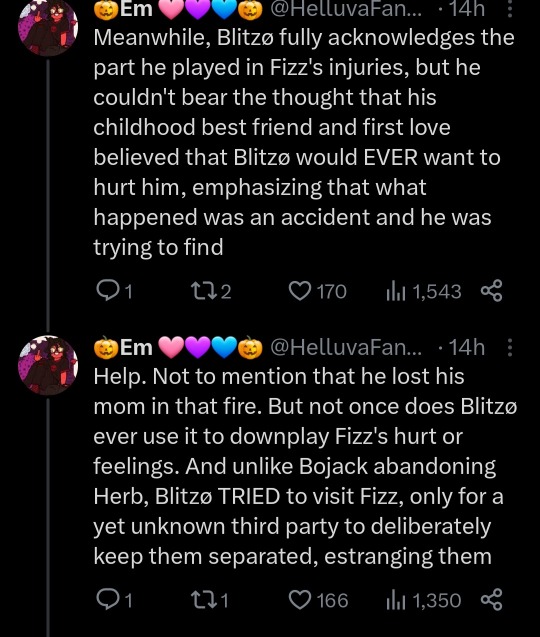
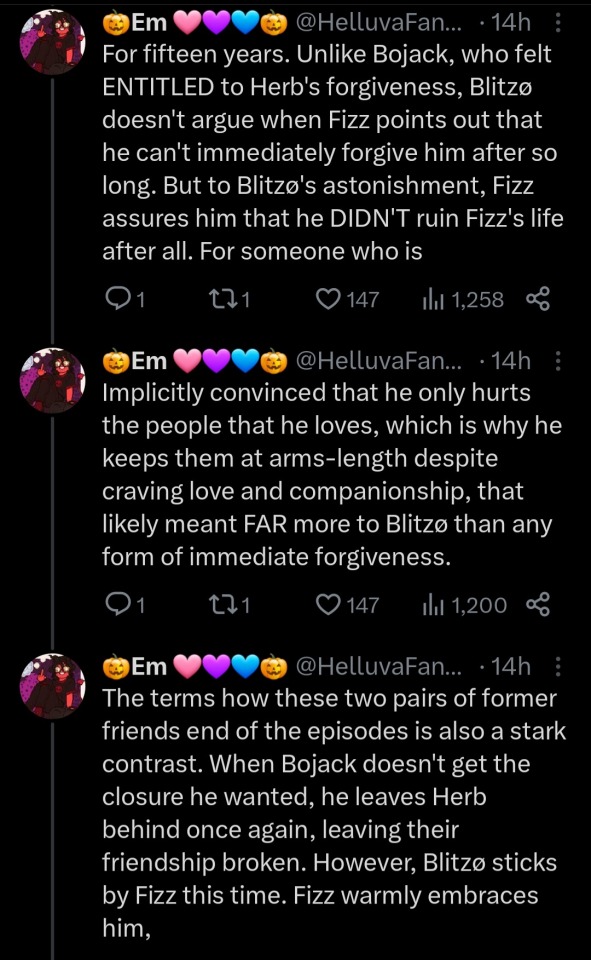
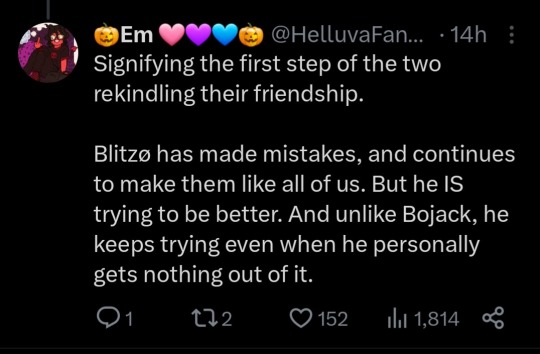
This is where I normally would keep just ripping apart the arguments, but frankly, there isn’t one anymore. For one, the original poster just blatantly lacks any fundamental understanding of Bojack as a series since the entire premise of the show is every season Bojack tries to change.
On a narrative basis, the lack of intentionality on Blitz’s part absolves him from needing forgiveness. Fizzarolli forgiving him holds no weight because Blitz didn’t intentionally set the fire, he didn’t see Fizz in the explosion when he ran away, he didn’t not try to see Fizz in the hospital and then Medrano puts the cherry on top about how Fizz’s life is actually better because of everything that happened. It’s equal parts boring and vile. The conflict is artificial, the resolution is repulsive and contrived. There is no depth to these characters and Medrano actively removes depth, either because she herself lacks the ability to comprehend it or because she knows her fans are incapable of doing so.
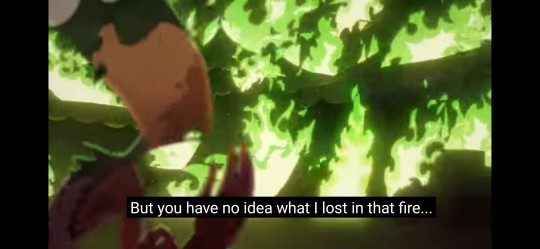
Also, let's just not comment on how this line explicitly overshadows Fizz's trauma. Everyone knows you don't end an apology with "but". That negates the whole apology. This is literally "I'm sorry you got hurt and I can never make that up to you, BUT my mom's dead so you don't even know what it's like being me and feeling responsible for that."
While the writers of Bojack sought to make their characters understandable and thus empathetic, they at no point excused or retconned the behavior. The writers on Bojack didn’t do anything to justify their characters in order to control how the audience felt about them. They were showing that the characters were well rounded, had reasons, why they had those reasons, what core memories made them who they are today. And the audience had the choice in how they responded to the characters. Medrano needs her audience to feel the same way about her characters as she does in order for the story to work, because she has never put forth the effort of actually telling this story.
One does not need the interviews with Bob-Waksberg to understand his cast and their story. Everything a viewer needs to know can be found in the show proper. There are not huge points of context happening just over there, off screen, between episodes and relegated to background details. Everything relevant to these characters and their stories is in the show. That has not and at this point never will be the case for Helluva Boss. So in many ways, yes. Helluva Boss is the anti-Bojack.
That's not a good thing.
#tw sa mention#philosophy#bojack horseman#bojack horseman spoilers#helluva boss critical#helluva boss critique#helluva boss criticism#vivienne medrano#vivziepop#vivziepop critical#spindlehorse critical#spindlehorse criticism#vivziepop criticism#long post#lots of repetition in places#i get philosophy is dense#its sometimes hard to grasp#especially for this fandom#sources#helluva long post#writing critique#critical thinking#essay writing
247 notes
·
View notes
Text
VERY LONG wolfstar fic rec list PART 1
I spend way too much time reading fanfictions and wolfstar is the love of my life so yeah. Also most of these are E and M rated cause I just love my smut
PART 2
PART 3
Please let me know if any link needs fixing or if there are any mistakes. Enjoy!
Multi-chapter:
Led by Light of a Star Sweetly Gleaming by wolfpants
Rating: E, 53k words Remus Lupin is a student and temporary sales assistant at Oxford's finest department store when a mysterious, handsome young man by the name of Sirius Black enters his life and introduces him to a world of sprawling country estates, parties, and London's underground bar scene. A 1960s Wolfstar AU with lots of music, smoking, fine interiors, and, of course, romance.
Of Cinema and Sticky Notes by bluepeony
Rating: E, 12k words Remus Lupin is the office bore. Sirius Black is the office sweetheart. They fancy each other, on a purely aesthetic level.
The Road to Sweetwater by EuripidesTrousers
Rating: E, 57k words “Well. They don't call me Mad Sirius Black for nothing”, Black drawls lazily, “Speaking of drinks - you got any whiskey in your pack there or just old biscuits? Caught me talking politics and now my throat's awful dry.” Remus lifts his brow incredulously, disbelief creeping into his voice, “You must think I got a real short memory thinking you're owed a drink after that show back there. You clean forget you're at my mercy, and then go trying to steal my horse-” “Not in the habit of letting a man put me in the dirt without buying me a drink”, Black drawls, his grin turning sly, “Or maybe you got something else that'll make defeat a mite easier to swallow.” Sirius Black is wanted by the law in the state of Wyoming and Remus Lupin, who's still deciding which side of the law a bounty hunter sits on, captures him for the price on his head. It should be simple. But there's something in the air that Fall that sets Remus' compass spinning, and nothing seems simple anymore.
Saturday Nights and Sunday Mornings by Soupy_George
Rating: E, 126k words Heirs to the peerage didn’t write rock songs or play bass, they wrote poetry and learnt the cello from the age of five. Heirs to the peerage also got married and continued the family line. They certainly didn't get struck by a bolt of homosexual lightning in the middle of a grotty pub in Sheffield…. * “No doubt,” the barman said easily, handing the card back across the bar, “Just thinking it were nice tha’ posh twats have stupid names too.” He pointed to his chest, “Remus, thanks t’me daft mam.” A story about music and family, the price of fame and finding love somewhere completely unexpected.
Statten Park and Sunshine on Leith (Freedom & Whisky series) by eyra
Rating: E, 32k words He's absolutely maddening. It happens every summer: this dance, this flirting that Remus has never quite managed to get to the bottom of. Either it's a complete wind-up and Sirius is even more of an entitled bully than Remus has always thought, or it's going to end with Remus letting Sirius bend him over the storage crates behind the catering tent one year. It's one or the other. The boys spend a glorious long weekend together at Sirius's family estate in the height of summer.
The Long Way Home by HollyIvyDruzy
Rating: M, 177k words "SEEKING TWO ROOMMATES FOR HOUSE SHARE – SINGLE ROOMS AVAILABLE IMMEDIATELY. FOUR BEDROOM HOUSE LOCATED ON EAST SIDE OF TOWN BY CATHEDRAL – CURRENT RESIDENTS FIRST YEARS. NO WEIRDOS PLEASE." Remus never expected to go to Westerbury University, but then he also never expected to meet force of nature Lily Evans while house-hunting, James Potter while replying to a horrendous handwritten advert, or Sirius Black once he had already decided to move in. Soon it becomes clear that even the best laid plans can be thrown out of the window when starting university living with a group of strangers. A university AU with a dash of humour, a sprinkling of angst and some pining for good measure.
Honeydew by lunchbucket
Rating: E, 40k words Healer Sirius Black feels like his life is going through the motions. He is still recovering from the tragic death of his best friends four years prior while doing his best to parent their five-year-old son. However, when a new patient's encounter with a mysterious creature leads him to contact a person from his past, his life gets shaken up into one giant beautiful mess that he isn't sure he knows how to handle. Or, That magic feeling when you find someone who can see you when you can't even see yourself.
Odi et Amo by afieryfox
Rating: E, ongoing Classics student Remus has everything figured out; his courses, his career path, his life — until a mysterious transfer student turns his whole world upside down. Remus despises Sirius Black from day one, quickly set out to beat his new academic rival in any way possible. Angry glares over text translations follow angrier words thrown at the other late at night. All too soon, hate morphs into obsession. And everyone knows what obsession leads to.
Petty (With A Prior) by lunchbucket
Rating: E, 65 words Showing up for his ‘civic duty’ is one thing, getting out of jury duty without losing his shit is another. Tack on an attorney who finds the whole fiasco hilarious, and Remus might as well be in hell. The Courthouse AU of my dreams.
Dunes and Waters by MarigoldWritesThings
Rating: E, 37k Remus is sensitive to changing tides, a part of the moon always with him, and Black is like the sea. He can smell it on him, the way his magic builds up and crackles about the fingertips. *** A werewolf, a convict, and a riddle.
Like an Accident by lurikko
Rating: E, 12k words November 1993: detective Sirius Black has a new case, and a new partner.
Black Diamonds and Moonlit Snow by iamafullyrealizedcreation
Rating: M, 66k words “A marketing manager from Wales, moved all the way to Maine, to work for a ski mountain, and you don’t even ski. Remus Lupin, you just keep becoming more and more mysterious. What other secrets do you have?” There were two paths in front of Remus, one where he flirted back with the beautiful, handsome, dangerous man in front of him, and one where he remembered that Sirius was his co-worker, and more importantly, made his living doing the one thing Remus hated most in the world. “You’ll find that beyond all that, I’m rather quite boring.” Remus said, as he settled on a decision. Sirius sat back in his chair and gave him a doubtful look, and the start of a smirk. “We’ll see.” Remus Lupin starts work at Mount Calset with the goal to bring people to the ski mountain, and has to learn to deal with "face of the mountain" famous ski racer, Sirius Black OR A story about overcoming your fears, and the type of love that makes you feel brave.
Go East by xinasvoice
Rating: E, 84k words Remus has been running for a long time. Eventually, he runs into a strange castle built by a wizard and his young apprentice. The longer he stays, the more secrets he uncovers...and the less he wants to leave. This is a novel-length adventure story that loosely follows the plot of Howl's Moving Castle. It does not require knowledge of the HMC book or movie to enjoy it.
The Horcrux Hunt by lostmy_keys
Rating: M, 143k words He is a Slytherin, a Black, and an ex-Death Eater. Of course he makes it out of the cave. Regulus sets out to destroy the Dark Lord's Horcrux with no one but a house-elf to help, until he realises his task is bigger than he alone can handle. Reluctantly he turns to the only man Voldemort fears for assistance - Dumbledore - who loans out his pet wolf for the job, much to Regulus's dismay. Together they embark on a hunt for Horcruxes - a long and arduous journey that both makes friendships and destroys them. And a few people get hurt along the way. Slowburn Wolfstar, Regulus character development, a very flirty (but platonic) Regulus and Remus friendship, and a canonically manipulative Dumbledore.
Where the Mist Falls by YumeNouveau
Rating: E, 30k words Remus loves being a deputy in the snowy mountain town of Greyback Peak. But when a crazy cult leader escapes in his woods and the FBI is called in, he's not about to just hand everything over to the stuffy know-it-all feds. That is, until he's confronted with silvery eyes, perfect cheekbones and a tailored suit that make his heart beat so loud it might start an avalanche.
Wish You Were Here by afieryfox
Rating M, 70k words Moony and Padfoot are both well-known online streamers that meet in an Among Us lobby organized by Lily. They instantly connect with their quick banter and similar interests, even with a whole ocean between them. Remus is alright with crushing on Sirius from afar. Until fans start shipping them and give them the name Wolfstar. Utterly ridiculous, of course. But why does Remus’ heart make a leap every time he thinks about it? And why, after countless hours on Discord calls, does he get the feeling that Sirius might feel the same?
Currents by lunchbucket
Rating: E, 109k words Remus Lupin and Sirius Black arrive in Sydney to compete in the Summer Olympics, both intent on making these games a better experience than the last. The two swimmers have a tumultuous history and intense rivalry, but can America’s golden boy and Great Britain’s notorious bad boy put their past behind them and find some common ground?
Where There Is Smoke by moongnome
Rating: not rated (oficially but it's actually E), 109k words "If he closed his eyes, he could have been there again, back in the cold river, water rising up to his shoulders, with a beautiful boy who wouldn’t leave him alone." It is 1865. Stuck in his house with his overbearing parents, Remus Lupin cannot shake the feeling that he's missing something. Returning from abroad after the death of his mother, Sirius Black is now the owner of a massive estate and he has the attitude to match. He has everything, including people who are determined to take everything from him. It takes seconds for Remus to know he will never hate anyone as much as he does Sirius Black.
The Homecoming of Sirius Black by lunarlivs, MissAmericanBi
Rating: E, 44k Sirius Black is burned the fuck out. From his high-pressure job, his unfulfilling love life, the concept of existence in general... you get the idea. With what used to be his life now just a smoldering pile of vaguely millennial-shaped wreckage drifting somewhere over the Manhattan skyline, Sirius leaves New York and moves home to Slytherin, Georgia—a wealthy suburb outside Atlanta—in an attempt to figure out what he is really doing in this prison of a meatsuit people call a body. Enter: a smoking hot bartender with big hands, amber eyes, and a stubbornly hardened exterior Sirius is determined to crack.* But with the passing of each month, Sirius starts to see that leaving a place doesn't mean forgetting the loss, returning to family doesn't mean coming home, and while love isn't found at the bottom of a pint glass—he may be the one pouring it.
How Remus Got His Groove Back by RealityShowJunky
Rating: M 43k words After two years of noncommittal sex: Remus tells Sirius that he loves him. Sirius firmly rejects him. Remus tries to move on. Sirius is not happy. OR Remus Lupin becomes king of the cockroaches, Fabian Prewett writes a book, Gilderoy Lockhart is a catfish, and Sirius Black realizes he's a fucking idiot.
Maybe this time is different (I really think you like me) by fiddleleafedfig
Rating: E, 73k words “Because you’re not just writing about Picasso, Sirius. Remus Lupin is a writer and an introvert, he has published a few novels that have been very well received. We want the story of it all, the family estate, his writing process, the decision to display these sketches now.” “And what on god's green earth makes me the best man for that job?” “Because you’re charming, we think he’ll like you.” * Or; The story of how Sirius Black gets a writing assignment, banters his way into the art-elite of London, and ends up falling head over heels in love.
Till We Have Arrived Home Again by prouvairing
Rating: E, 44k words Summer, 1999. Harry comes home with news. Quite a lot of news. Harry takes a deep breath. “I'm quitting the Aurors,” he starts with, which is followed by a moment of stunned silence. “What?” Sirius says. “All right," Remus says. “Do you know what else you want to do? Did you think about it?” Harry blushes, the way James used to—a rosy glow lighting up his brown skin—and says, “I wanted to—that is, I thought I might be a teacher.” Remus, quite suddenly, seems to have something in his eye. "Oh." “What?” Sirius says. “And uh—there's more. I was thinking I might like to. That is. I want to become an Animagus.”
Lines by Krethes
Rating: E, 24k words "As if feeling Sirius’s eyes on him -- and maybe he does, Remus just Knows Things sometimes -- he looks over his shoulder with eyes heavy-lidded and sleepy. “We’re far too old to be having morning sex and you know it, Padfoot,” he warns, his voice still gravely and deep from slumber." OR: DILF Wolfstar getting the happy ending they deserve. Chapters are chronological, but it's largely PWP and we're just here to have some fun.
No Expectations by thisbluepeony
Rating: M, 98k words Remus Lupin is a little-known music journalist working on a little-known music magazine. Blue Stag are his next Big Project - well, his first anyway.
Ever Thus by WrappedUp
Rating: E, 135k words “Right, well I’d say it’s about time to put an end to this nonsense, wouldn’t you?” James nodded sagely. “You’ve obviously still got some things to chat through with him, but he will talk to you about it, Remus. He thinks the world of you, you know that. But the important thing is that you do talk because nothing’s going to get sorted if you just sit cry-wanking in your room.” The world is excruciating and enthralling in equal measure. The gang try their hardest to navigate it as real, legitimate adults.
Language Lessons by MsAlexWP
Rating: E, 150k words September 1982 The war is over. Voldemort was defeated on October 31, 1981. Regulus Black discovered Voldemort’s horcruxes and informed the Order of the Phoenix, which destroyed them. When Voldemort arrived on Halloween to kill baby Harry, the Order was standing by, ready to kill him first. Almost a year later, the Marauders and their friends are rebuilding their lives. Everything is going well for Sirius Black. Everything but love. OR Sirius Black is great at sex but shit at relationships. Remus Lupin is an amazing boyfriend, but not so great at sex. Could these best friends learn from each other? Platonically, of course.
Hurling Crowbirds at Mockingbars by WrappedUp
Rating: M, 41k words “He’s coming home, James. What the hell am I meant to do with that? It’s been eight fucking years and we’re meant to... what? Just meet him at the pub? Buy him a drink like-” He shakes his head. “What will I do with my face?” James takes a sip of lemonade, taking his role as designated driver very seriously as always. He has a smudge of dirt on his nose from ‘wrestling a conifer the size of a bear’, but Sirius doesn’t think to mention it because he’s somewhat preoccupied with his own problems, which, for the avoidance of doubt, are many and insurmountable. “Your face?” “Yes, exactly! It’ll give me away the second he sees me. He’ll know right away that eight bloody years has done nothing at all to dampen it down. Dripping with hurt. As if I don’t still feel-”
One-shots:
Babysitting by A_factorygirl_69
Rating: E, 5,5k words Sirius and Teddy's excellent adventure, or why Remus is a master manipulator.
No Reckoning Made by A_factorygirl_69
Rating: E, 22k words Trying to remain friends but also wanting more while in the middle of a war is far more difficult than Remus ever imagined. Sirius certainly isn't making it easier on him either.
Secrets in the Black of night by TracingPatterns
Rating: E, 6k words It all starts when Remus is paired with Sirius fucking Black in Potions, but Remus didn’t think this was where they would end up.
Buy the Stars by wilteddaisy (taotu)
Rating: E, 23k words Sirius Black, respectable pureblood patriarch and heir to the Black family fortune, has a wife and three children at Hogwarts. Defence Against the Dark Arts professor Remus Lupin wrestles with the aging wolf inside of him. When Black offers him a hand, Remus reluctantly takes it.
Nosebleed by WrappedUp
Rating: T, 8k words “I can’t have a threesome, Lily. I do puzzles for fun. I drink Ovaltine. I have a mug that says ‘I heart spreadsheets’. And it wasn’t even a present; I went out and bought it for myself because I really do. I heart spreadsheets.”
That Old Black Magic by fallovermelikestars
Rating: M, 37k words AU in which Remus, being as he is a werewolf and all, is homeschooled til he is 16. Hogwarts is something of an experience, not least because there's this boy called Sirius Black.
illicit affairs by dykesiriusblack
Rating: E, 8k words They shouldn't. But they do.
The Power Of The Dog by Suchsmallhands
Rating: E, 71k words Sirius thought he left the Black family behind but he is forced to face them once again when charged with the death of his mother. Who do you think will be his defender?
you jump, I jump by grumposaur
Rating: M, 17k words When Remus witnesses a disturbing event walking home one night, it sends him down a twisted path of many discoveries: secret societies, macabre rituals, cloaked figures, and a dark-haired boy who proves to be the most dangerous of all.
Satellites by jennandblitz
Rating: E, 23k words Sirius Black is the guitarist for Starsign, a band on a meteoric rise to fame. One evening in Edinburgh and he finds himself face to face with Remus Lupin, gig photographer an in almost-criminally oversized punk shirt. Perhaps things aren't meant to be at first, but the universe has its ways…
After us, the flood by aryastark_valarmorghulis, bloodsuitsandtears
Rating: E, 10k words “I was hoping you might be waiting for me.” His tone is light and friendly, but Remus isn’t fooled. “I stopped for a smoke.” He wonders, though. Was he unwittingly waiting for Sirius? In the last eight years, there had been countless smoke breaks, quick trips to grab another wine bottle and rendezvous to decide James’ birthday gift that dissolved into a sloppy snog or a quickie. It didn't happen every time Sirius was back in the country, but it was close enough.
bookends by drowsyanddazed
Rating: E, 12k It’s 1995 and the only flat in London that Remus Lupin can afford is one that’s falling apart and riddled with curses. When the curse-breaker comes in to survey the place, it’s Sirius Black who shows up at his door. On Remus’ doorstep, in 1995, they go through introductions. But they knew each other in 1982, back at university, they knew each other quite well, so why are they pretending they don’t have history? He’s not quite sure what’s going on between them, what they’re doing, what this tightrope they’re walking is. He’s not sure it’s a good idea.
Love, Trust and Other Wartime Casualties by BellaBabe
Rating: M, 8k words “Full moon?” Sirius asks, realizing he doesn’t actually know. Remus looks at him oddly. “You know you were always the most attentive. James was too carefree, too unburdened and Peter too forgetful… but you, you always knew.” It’s a well placed blow and it leaves Sirius breathless. “Things change I guess.” Remus says softly. “I’m here now.” Sirius can taste the lie on his tongue. Remus hums noncommittally and pours them more tea.
Lie With Me by mblematic
Rating: M, 12k words Sirius meets Remus unexpectedly, in somebody else's body. Nobody trusts anybody.
Elucidation Practice by montparnasse
Rating: M, 21k Christmas, 1978. Remus, wrestling with the mighty problems of gift-giving on a budget, contemplates life, love, London in winter, and falling off the edge of the world with Sirius Black.
Don't Make Me Beg For You (Because I'll Beg For You) by CuriousMay
Rating: E, 14k words Sirius' head jerks round, eyes wide with shock. Remus is still speaking but all Sirius can hear now is white noise. He stares at Remus, who is carefully constructing his chicken sandwich as he talks, seemingly unaware of the conversational grenade he's just launched into the room. "What?" "You know, Rita Schaffer? She was that 4th year who had that incident with Bleatchley's Beauty Bleach in '75 just after our exams and Madam Pomfrey had to regrow all her hair-" Remus starts as he puts down the tomato but Sirius cuts him off with a sharp wave of his hand. "No, not that, you idiot. The other bit. You said - you said you're in love with me?"
Horoscopes and how they caused the Plague of Frogs by Woldy
Rating: E, 6k words This is the story of the most improbable job Remus ever had, the Chocolate Frog Plague of 1980 and, incidentally, how he first kissed Sirius.
A Series of Sketches Done in Black Ink by mustntgetmy
Rating: E, 57k words Non-magic AU. Sirius had always imagined the aftermath of falling in love would mean lightness, and an escape from all the horrors of his childhood. But the past never leaves, and even love can't stop bad memories from resurfacing. An almost year in the life of Sirius and Remus's first year as a couple replete with art and tangled sheets, and containing the following: filled sketchbook pages from people lost and people found, terrible biscuits from an excellent therapist, mismatched music records, expensive hot chocolate, a lost brother, photographs (some invasive and some invoking terrible memories), a reckoning with the past, a promise of the future, and yet another ridiculously over the top Halloween party.
Within White Space by mustntgetmy
Rating: T, 9k words Non-magic AU. Remus spends his all his lunch breaks the same way: he sits at the university cafe, orders the cheapest thing on the menu, and stares at Sirius. Getting a good long, look at Sirius (and fantasizing about said look) is all Remus expects from Sirius. But Sirius has never been one for fulfilling expectations.
Black Glass by estas_absentis
Rating: E, 4k words Remus already holds Sirius’ heart in his hands, carries it with him through the world, could crush it if he chose. Why not his mind, his self, too?
#wolfstar#fanfiction#ao3#remus x sirius#sirius black#sirius orion black#remus loves sirius#remus john lupin#padfoot#remus and sirius#moony#wolfstar fanfiction#wolfstar fic#wolfstar fanfic rec#harry potter#hp#hp fanfiction#fanfiction rec#fic rec#hp fic rec#the marauders#hp marauders#hp fandom#hp fanfic#james potter#regulus black#james fleamont potter#lily evans#remus lupin
46 notes
·
View notes
Text
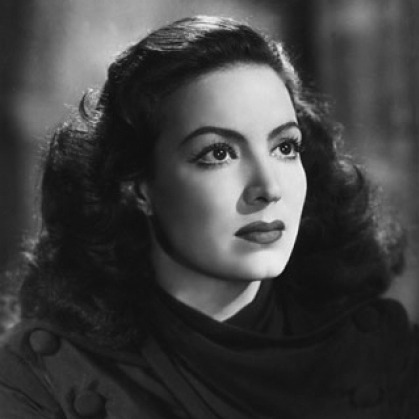
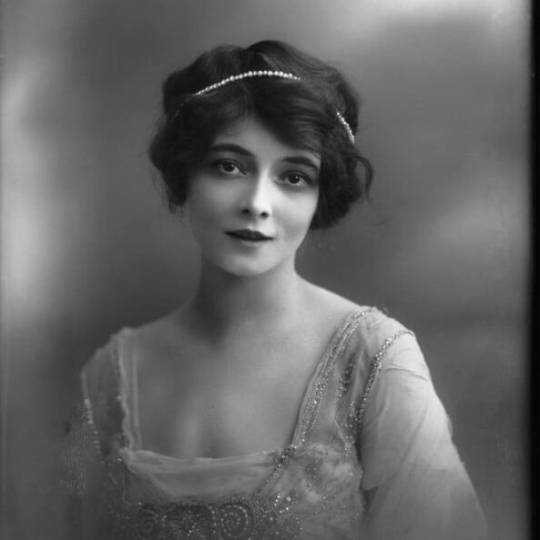
Propaganda
María Félix (Doña Barbara, La Mujer sin Alma, Rio Escondido, La Cucaracha)—Maria Felix is still possibly the most well-known Mexican film actress. She turned down multiple-roles in Hollywood and a contract with Metro-Goldwyn-Meyer in order to take roles in Mexico, France, and Argentine throughout the 1940s, 50s, 60s. She was so famous and so respected as a dramatic actress that she inspired painters, novelists and poets in their own art--she was painted by Diego Rivera, Jose Orozco, Bridget Tichenor. The novelist Carlos Fuentes used her as inspiration for his protagonist in Zona Sagrada. She inspired an entire collection by Hermes. In the late 1960s Cartier made her a custom collection of reptile themed jewels. She considered herself to be powerful challenger of morality and femininity in Mexico & worldwide--she routinely played powerful women in roles with challenging moral choices and free sexuality. But even still, years after he death, she is celebrated with Google Doodles, and appearances in the movie Coco, and holidays for the anniversary of her death.
Marie Doro (Lost and Won)—I had never heard of this woman before the prelims a couple of weeks ago, but oh my GOD I have not been able to stop thinking about her since. Look at her!! She was often typecast as delicate, fragile types on stage and screen, but in real life she was "intelligent, an expert on Shakespeare and Elizabethan poetry, and possessed a penetrating humor and a sometimes acid wit"(!!!!) and known for bringing vibrancy and intelligence to all of her roles. Unfortunately most of her films have been lost, but she was considered a highly sought-after lead actress through the '20s, at which point she retired from acting. In her later years, she went back to school, taking university courses in theology, physics, metaphysics, and philosophy. She was also reportedly close friends with Maude Adams and Mercedes de Acosta, both known for their lesbian relationships, which has led some (me) (but also others) to speculate that she may have been lesbian or bi herself. She has a star on the Hollywood Walk of Fame! She was Charlie Chaplin's first love! She was so beautiful??? I want her to recite poetry for me while we picnic in the park.
This is round 3 of the tournament. All other polls in this bracket can be found here. Please reblog with further support of your beloved hot sexy vintage woman.
[additional propaganda submitted under the cut.]
María Félix:
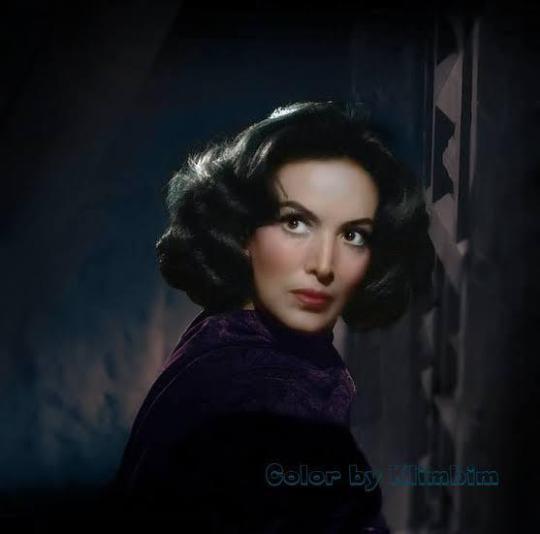
She's Thee Hot Vintage Movie Woman of México. She's absolutely gorgeous and always looks like she's about to step on you. you WILL be thankful if she does.
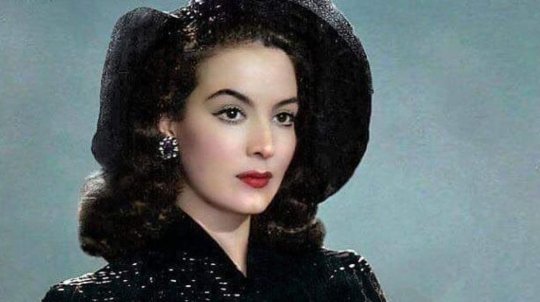
"María Félix is a woman -- such a woman -- with the audacity to defy the ideas machos have constructed of what a woman should be. She's free like the wind, she disperses the clouds, or illuminates them with the lightning flash of her gaze." - Octavio Paz
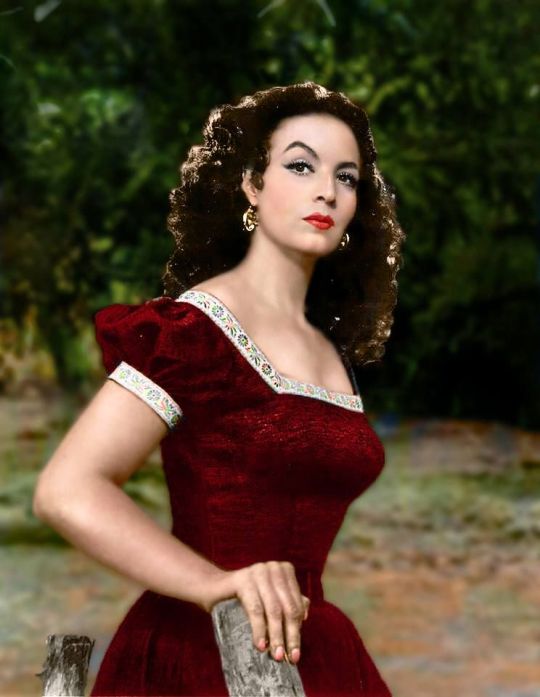
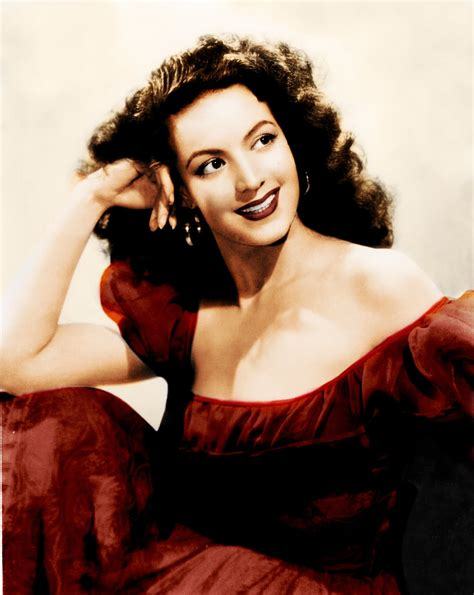
María Félix is one of the most iconic actresses of the Golden Era of Mexican Cinema. La Doña, as she was lovingly nicknamed, only had one son, and when her first marriage ended in divorce her ex-husband stole her only child, so she vowed that one day she’d be more influential than her ex and she’d get her son back. AND SHE DID! María Félix rejected a Hollywood acting role to start her acting career in Mexico on her own terms with El Peñón de las Ánimas (The Rock of Souls) starring alongside actor, and future third husband, Jorge Negrete. She quickly rose to incredible heights both in Mexico and abroad, later on rejecting a Hollywood starring role (Duel in the Sun) as she was already committed to the movie Enamorada at the planned filming time. Of this snubbing she said, quote: “I will never regret saying no to Hollywood, because my career in Europe was focused in [high] quality cinema. [My] india* roles are made in my country, and [my] queen roles are abroad.” (Translator notes: here the “india” role means interpreting a lower-class Mexican woman, usually thought of indigenous/native/mixed descent —which she had interpreted and reinvented throughout her acting career in Mexico— and what abroad was typically considered the Mexican woman stereotype, with the braids, long simple skirts, and sandals. This also references the expectation of her possibly helping Hollywood in perpetuating this stereotype for American audiences that lack the cultural and historical contexts of this type of role which would undermine her own efforts against this type of Mexican stereotypes while working in Europe) She was considered one of the most beautiful women in the world of her time by international magazines like Life, París Match, and Esquire, and was a muse to a vast number of songwriters (including her second husband Agustin Lara,), artists, designers, and writers. Muralist Diego Rivera described her as “a monstrously perfect being. She’s an exemplary being that drives all other human beings to put as much effort as possible to be like her”. Playwriter Jean Cocteau, who worked with her in the Spanish film La Corona Negra (The Black Crown) said the following about her, “María, that woman is so beautiful it hurts”. Haute Couture houses like Dior, Givenchy, Yves Saint Laurent, Balenciaga, Hérmes, among others, designed and dressed her throughout her life. She died on her birthday, April 8, 2002, at 88 years old, in Mexico City. She was celebrated by a parade from her home to the Fine Arts Palace in the the city’s Historic Downtown, where a multitude of people paid tribute to her. Her filmography includes 47 movies from 1942 until 1970, and only two television acting roles in 1970. She has 2 music albums, one recorded with her second husband, Agustín Lara, in 1964 titled La Voz de María y la inspiración de Agustín «The voice of María and the inspiration of Augustín», and her solo album Enamorada «In Love» in 1998. Her bespoke Cartier jewelry is exhibited alongside Elizabeth Taylor’s, Grace Kelly’s and Gloria Swanson’s. In 2018, Film Director Martin Scorsese presented a restored and remastered version of her film Enamorada in the Cannes Classics section of the Cannes Festival and Google dedicated a doodle for her 104th birthday. On august 2023 Barbie added her doll to the Tribute Collection.
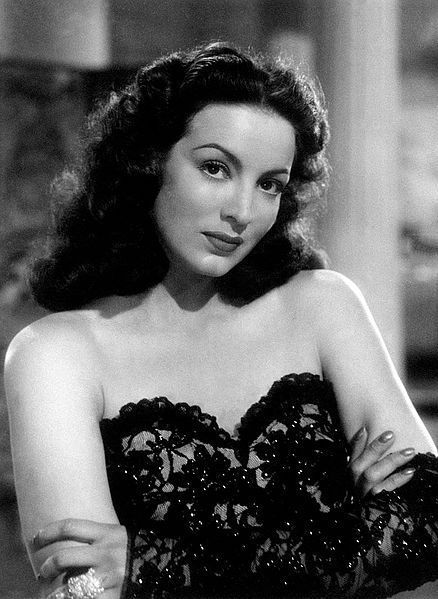
Marie Doro:
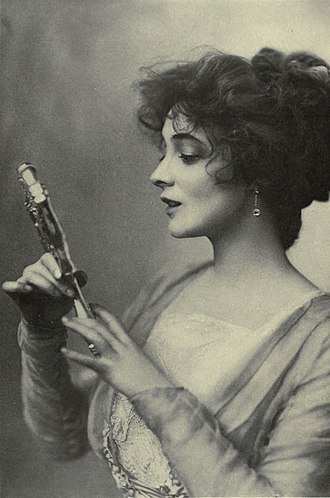
Unfortunately nearly all of Marie Doro’s movies are lost, and I don’t know a lot about her, but as soon as I came across Marie for the first time, I fell in love with her. The early Edwardian era is my favourite decade for fashion, and Marie wears it all so well! In every photo she looks like an angel made out of porcelain, too perfect to be real. She was Charlie Chaplin’s first love, and he remained in love with her for years after their first encounter, and let’s be honest, who can blame him? He said about her in his biography:
‘She was so devastatingly beautiful that I resented her. I resented her delicate, pouting lips, her regular white teeth, her adorable chin, her raven hair and dark brown eyes. But, oh God, she was beautiful! It was love at first sight. At the theatre I would time the moment that she left her dressing room so as to meet her on the stairs and gulp 'good-evening.' When I met Marie Doro again, it was like the second act of a romantic play. After we were introduced I said: 'But we've met before. You broke my heart. I was silently in love with you.' Marie, looking as beautiful as ever, said: “How thrilling”.
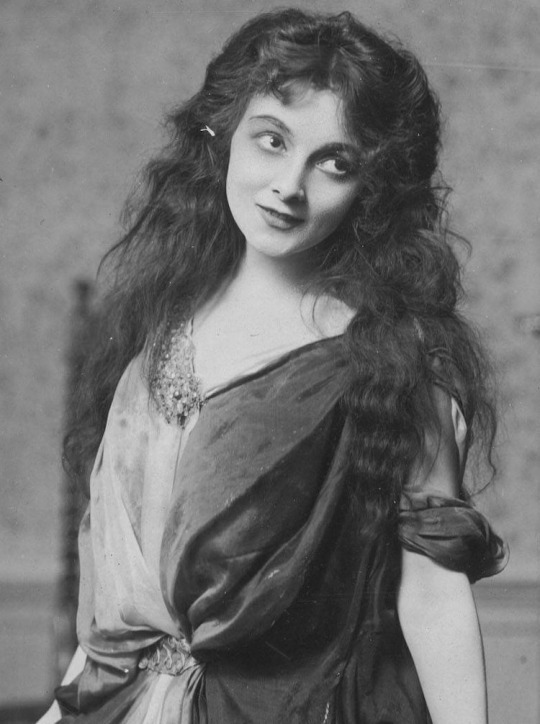
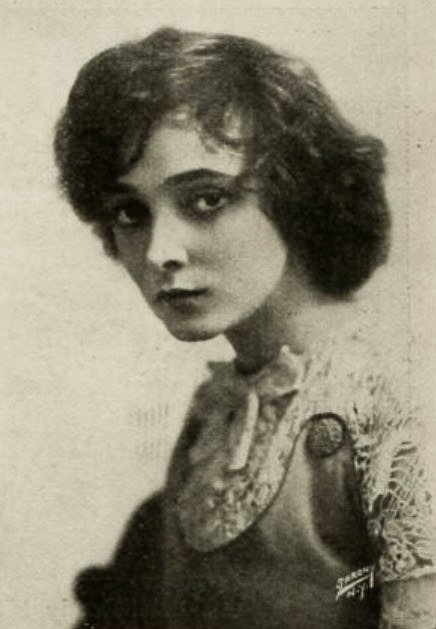
Doro retired from filmmaking in the 1920s and became very reclusive after that, so unfortunately there’s hardly any footage of her to watch. I feel sad that more people don’t know who Marie Doro is, because she’s very important to me.
Linked gifset to see Marie in action
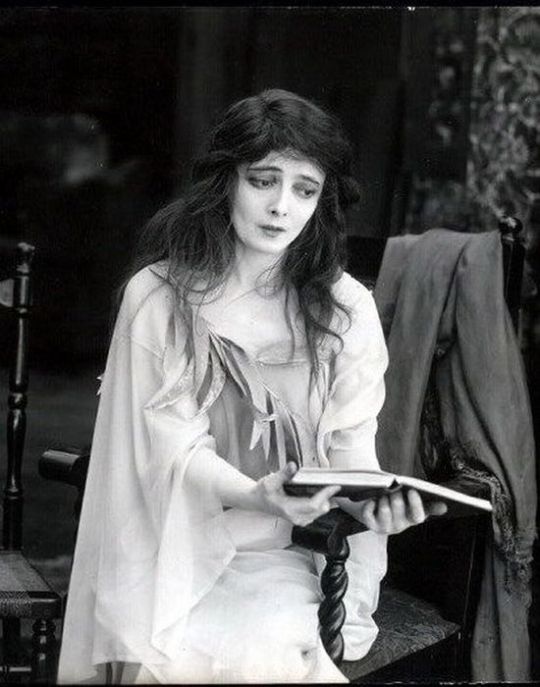
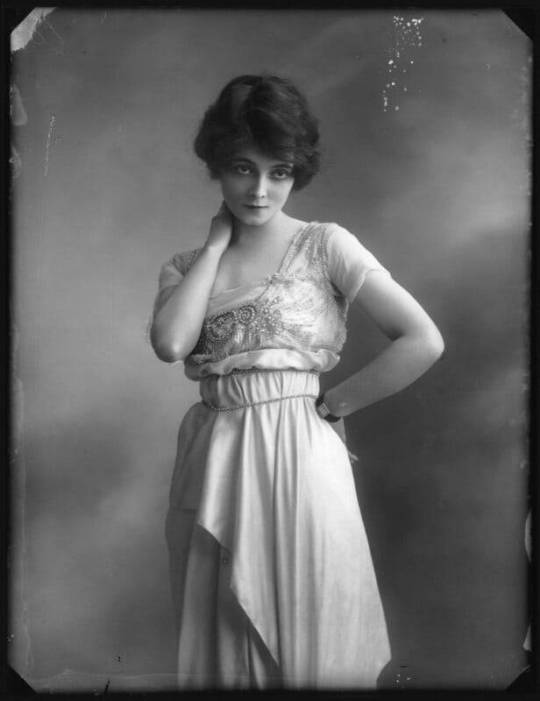
124 notes
·
View notes
Text
🎀introduction to my account!!!🎀
hello, my name is alexandra cassandra and i have recently joined tumblr. my dm’s are always open but if you are estranged or unsettling, i will block you.
i absolutely adore the cinema, poetry, literature, vintage paintings, cinematography, ballet dancing, healthy eating, writing and reading, making collages, constantly daydreaming, and obviously girlblogging.
i always follow back so don’t be shy!!! this is a safe space for everyone and i am very open to moots. i will try to post enough and you can dm me any ideas you think i should post or recreate.
#cinema#vinatge#tumblr moots#weight loss diet#bones and all#fruits#vegetables#introduction#outer banks#stranger things#skins uk#cinemetography#lana del rey#fiona apple#courtney love#moot me#looking for moots#hello tumblr#girlblogging
29 notes
·
View notes
Text
Oilver Swift Headcanons Because Im Horridly Forgetful<3
Relationship;
—Okay, too start off he is the most supportive dork you will ever meet
—loves you more than anything-
—He actually has like four brain cells are three of them are specifically for remembering your anniversary
—He takes you to the damn cinema so excitedly like he doesn’t work there-
— gets you a discount on drinks whenever you go
— he also flirts..well, attempts too-
—HE. FUCKING. GIGGLES. AND. TUCKS. IMAGINARY. HAIR. BEHIND. HIS. EAR WHENEVER YOU FLIRT BACK
— god hes chaotic as fuck too-
—if y’all even consider marriage Gingi has to be best man-
Overall a 900/10 relationship<3 :DD
Friendship;
—y’all are getting up to absolute NONSENSE together-
—hes so fun, he just bounces around commits arson and gets high all in one day with you trailing behind him either encouraging his chimp-like behavior or desperately trying to calm him down-
—PLEASE PRAISE HIM FOR DOING BASIC TASKS- he has a very bruise-able ego!!
—So you know how dogman told us how exactly phones kiss? Like, gentle face mashing? He practiced with you-. 10000% yes he did-
—start a book club with him he’ll be your biggest fan and you two can read Dostoyevsky together or sum-
—HE TEXTS IN ALL CAPS WITH ABSOLUTELY NO PUNCTUATION OR GRAMMAR
9/10 friendship in general! (One point docked if you don’t match fez’s with him, then he’ll ghost you and cry in Randy’s dumpster for half an hour)
General;
—…here me out, man’s got pec’s to feed a village. (I’m a good person I promise.)
—Hes a veeeeeery physical touch oriented guy, literally has his arm around someone 24/7
—addicted to Mountain Dew, it’s chronic at this point
—hes a very talented painter, probably only paints the lewdest things imaginable but still, it’s something!
— he makes his bed a very specific way and actually beams whenever someone compliments it
—he has a collection of classic literature and poetry that he will rant about upon asking
—Jerry’s adhd son- Oliver has Jerry on speed dial incase he tries doing something strenuous and or stupid- (yes I realize how odd that speed dial part sounds upon reading it over)
— Owns over eight flannels for different ocassions-
—…….hes very experienced in the lewd activities some of you’d like to partake him don’t ask me how I know-
Overall, If you can’t tell I loveeee this silly little moron- (apologies once again for this taking so long once again, I appreciate all of your support so very much- please, send me a request if you’d like more-) (it also wouldn’t let me add the photo at the top AAA tumblr how darent you-)
(Update: OH. MY. GOD??? THANK YOU SO MUCH FOR THE SUPPORT I LOVE EVERYONE OF YOU-)
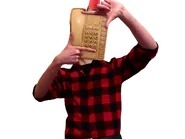
#dialtown#randy jade#dialtown oliver#dialtown randy#jerry dialtown#dialtown phone dating sim#oliver swift#hes my bbg#I
55 notes
·
View notes
Text
WILLIAMS LEE character x Reader.

My idea is to take William's character as bisexual. I hope whoever reads this enjoys it. sorry if there are mistakes, <3
Notes: I left it to there, I feel it can continue, if you feel the same let me know in the comments. Would you help me continue writing. ;)
Warnings: age ap but not much.
My only recommendation is that you can listen to this song while reading.⚘️
You are in a bar where each person has a special aura. There are groups of friends, there are lovers floating around, looking at each other between tables and then the marginalized ones who, despite wanting what is supposed to make you belong, can't even achieve it there, there is were you belong too.
You were a writer who had been lucky at the beginning, you wrote poetry all the time but you began to be interested in writing scripts, you tried to send some to certain production companies to make money and start making your name known, you dreamed of combining poetry and cinema. You had only one good opportunity but currently everything was going downhill, they rejected you, they called you corny, they rejected you fir being a woman, they wanted to modify important parts and the list goes on so you were very frustrated because you feared that your desires and dreams were running out as well as your saved money. Your last point of hope was Mexico where you had a friend couple, They invited you to stay as long as you need. Much of the day they are involved in their projects amd work so you started to make a habit of going to a bar a few blocks near his house to not really being a burden.
The bar was pleasant to look at although you saw raw things on more emotional levels, loneliness and anguish on faces filled with alcohol, but one night everything changed. It was a Thursday that for some reason you had been very inspired, writing for hours but without consuming alcohol, only coffee and soft things but the night arrived and you decided to go order a drink as a reward, when you approached the bar you felt an absolutely peripheral gaze intense and you had a kind of need to turn around and look at those eyes that were chasing you. You discovered the most charming and deep blue eyes like you had never seen before. This men was surprised that you turned with an honest look, not a grimace of disgust or seriousness like he usually received. He saw you and made a strange gesture that confused you a little but made you laugh, this exchange with this stranger made you smile but the bartender gave you the drink and brought you back to earth from the situation so you simply returned to your table, surrounded by books of poems and leaves.
You had your back to him where you were sitting, you had a view of the window, you liked that place because you can saw the night, the stars, this tiny part of the city, the houses with warm lights on inside, surely there were families you thought, that gave you a little comfort. But immersed in your world of writing someone surprises you, making you scared, but smile instantly when you notice who it was...
Williams: I'm sorry to scare you, I understand, I have a very particular face and even more so at this hour. He looks at his wrist with an imaginary watch.
Yn: It wasn't your face, I was very focused. You say kindly, observing his face now in more detail. He had quite admirable eyes but beyond the cliché of their color they had fire inside them in some way, they told a story as their wrinkles around their eyes traced a path, his hair quite soft and light, an impulse to run your hand through invaded you, you thought it sure looked like a fantasy in the summer, and a smile that surely had the last trace of innocence in that body, you sensed it.
Williams: With permission, i see you put together a kind of really interesting desk here.
He sat analyzing the names of the authors. For a moment you feared that he was a snob who would come to give you his opinion, you had experiences like that with men, but instead almost verbally he began to flatter your taste and ask you how you had obtained certain copies.
Yn: My grandmother who raised me worked in a bookstore and she basically gave me that as an education, now she is old and stopped working, one of my brothers maintains the store and from time to time he send things. You answered sincerely and a little intimidated by the strength of the attention this man gave you when he looked at you.
Williams: Wow, how interesting, I'm sure you have read a lot throughout your life.
Yn: Yes, honestly, but before asking you about your favorite authors, I would like to know your name.
Williams: My name is Williams Lee. I would like to know yours, beautiful lady.
Yn: *Smiling at that last added comment.* My name is yn.
Williams: Oh great name, I think I could write a poem based on it, give me a few days to recover from the amount of alcohol I ingested today.
You laughed at the confession although you found it bittersweet that he was there today and he's probably always watching time sink into addictions in places like this.
YN: I would like to hear it, does the version with a drink on and without a drink, change anything?
And by this point you two were already in a world immersed under a beautiful warm lamp with the contrast of the blue sea in the sky, it seemed to be meters away, there was something special about this man in front of you. So enigmatic, striking, hypnotizing, above all melancholy. You two talk a lot for a hours.
Williams: You know, I'm scared to do the non-alcoholic version, I'm afraid of what it might feel like. If half anesthetized I feel so much seeing you, it won't go away when I'm really at one hundred with myself.
Yn: You don't know how many times you blush, shaking your head while he laughs at your reaction. Hey I write poems too I can try, could be a great competition. You said with a more playful and lighter tone.
Williams: Done deal miss.
He gave you his hand. At that moment you felt strange, the softness of his palm impacted you, it gave you tenderness that neither of you two let go the other's hand, laughed about it when you two noticed it.
You two talked for a while, about books, some movies and ended up obviously talking about love.
Williams: if you like we can go outside to smoke, I'm sure there's more air than in here with these faces.
You understood what he meant, it was an hour where people's loneliness and sadness came out of their pores if you looked around you. you packed your things and left.
Outside you offered him your cigarettes and he gave you the fire to light it. He got too close to your face to help you light it on purpose, you blushed when, making a kind of tent so that the fire wouldn't go out due to the wind, he touched your face with his hands. Furthermore, his gaze so close to you penetrating made your heart race a little, you wanted to caress his face and take away all the weight of whatever was weighing on his head, which could be seen for miles.
Yn: Have you lived here long? Do you plan to settle here?
Williams: At some point I would like to leave and move on, continue living in other places. My relationship with this place is contradictory, it has given me a lot but I still resist certain things
Yn: I think we will never be as comfortable as we were in the innocent times when we lived in our native home. And not even that place sometimes welcomes us.
You say, looking far away, as if you were seeing the moments when you felt the feeling of family projected in the sky. You miss everything so much and at the same time you don't know what it is.
Williams looks at you this time without specific intentions, he looks at you, he looks at your eyes. He wants to hug you or touch your face but he fears that the extreme need that characterizes him so much will push you away and he seems like a weird stranger. You've known each other for hours but he never felt this connection before. However, something uncontrollable inside him gets the better of him and he runs the back of his hand tenderly over your cheek, he needed to be closer to you in some way or another. You closed your eyes and blew out the smoke of cigarette to turn around and end up facing him, showing that you felt the same need as him. And he continued with the same movement and something strangely impulsive, a very strange thing for you to be in “love” or with people you like because it really takes you a while to let you~ go. It seemed like Williams had uncovered something in you, a kind of suffocating desire, so at one point you held his hand through the up-and-down motion against your cheek and turned his hand over to kiss his palm. Kisses all over his palm, cautious but sweet.
Williams, for his part, felt out of breath, like when he takes drugs, even the times he had the most excess he never felt anything like that. Look at you dazed, feel you. And suddenly, in a nebula, everything around you ceased to exist, just the lights out of focus in the background and your perfume . You stopped kissing his hand and you two continued looking at each other intensely as if knew all the secrets about each other. You two began to get closer and now he held your face, giving you kisses around your cheeks, jaw, the sides of your mouth getting closer and closer, causing a sensation of indescribable heat and cold inside you, paralyzed but you wanted more, your eyes were closed it seemed like dreaming but you couldn't take it anymore so you took the initiative. You two melted into a kiss that denoted need and longing on both sides. He holds your face with a gentleness you didn't know he could have, and you twist the hair near his neck into a spiral. You feel like you haven't felt in a long time, you want more like a spirit took over your body. Your chest and his, increasingly closer, connect the beat of hearts in unison as if it were music. You lowered your hands gently down his neck and the kiss became more and more intense, you felt his tongue enter your mouth as if it were hunger and you moaned silently feeling like you coul die right there.
At one point you were running out of air and you broke away abruptly laughing.
Williams: I thought you were going to run away suddenly. You laughed at his comment and moved closer to him.
You two leaning against the wall under the night looking at each other, talking intimately in a bubble that isolated from the world. There was a little cool breeze so you didn't hold back and touched his hair, hair like wheat, he smiled, he lcoes that you do that. For his side he talked to you about the color of your lips and you eyes, babbling in a conversation just to continue sharing and flirting, having each other around to admire each other . He was so tall, big and wise, you sighed like when you were a teenager, felt like you had very rarely been listened and understood this way in your life. Immersed listening to you, he saw that you were in a position where you were just under the moon, so he remembered that his camera was in his bag and he surprised you by taking a photo.
Yn: You surprised me oh god. You two laughed together. You wished you had turned out well, you felt insecure for a moment.
Williams: you were just standing in a way that the moon was shining on you, it seemed absolutely necessary to capture the moment beyond that in my mind.
Yn: oh what a poet, I hope it turned out well.
Willlams: Don't get me started on how you look. You two peed at each other in silence with a smile after that, your heart felt like it was exploding.
Yn: I think it's getting late although I would love to see you again, I mean for the delivery of the poem and now I also want to take a photo of you to bec at hand"
Williams: Yes artist princess, of course there will be another meeting. You two laughed at the same time .
Williams: I can accompany you if you want, it's also kind of ugly to walk through the streets alone at this time of night...
Yn: Yes of course, I would also love to continue our very interesting talk about Greek authors.
Williams: Yes absolutely, I think the talk was interrupted by a slip, the best kiss someone gave me on my life, it doesn't matter.
You burst out laughing.
Yn: You will be my death.
To be continued…
#writes on tumblr#my fic#hope you like <3#daniel craig#Spotify#queer movie#williams lee x reader#williams burroughs
12 notes
·
View notes
Text

𝒲𝑒𝓁𝒸𝑜𝓂𝑒 𝓉𝑜 𝓂𝓎 𝒷𝓁𝑜𝑔
ꨄ my name’s Sophia but you can call me Phia :3
ꨄ I’m 18 and I’m Slavic
ꨄ my zodiac sign is Gemini
ꨄ interests: psychology, philosophy, music, the 20th century, art, cinema, literature, poetry, the grotesque, true crime, etc.
- i love talking about all sorts of things, i don’t get easily disturbed and i don’t consider anything a taboo topic. You can talk to me about anything, i don’t judge.
ꨄ music: i listen to a lot of different genres and I’m very open minded when it comes to music.
ꨄ movies: i like experimental films, weird and surreal, grotesque ones, but i also watch feature length movies and my favorite genre is horror along with psychological thriller.
ꨄ i don’t label myself as anything except a human being. I don’t have a certain style, i do my own thing.
ꨄ on this blog i post things i find interesting. I post mostly about Izzy Stradlin aka my comfort person, my soulmate, and the love of my life.
Sometimes i like, reblog and post things that some people might find disturbing, so if you’re easily offended/disturbed, i suggest you leave my blog.
If someone needs someone to talk to, feel free to dm me, i absolutely don’t judge and i really mean that. I’m here anytime for anything <3.
dni: men
my other socials:
spotify
instagram
letterboxd
pinterest
︵‿୨♡୧‿︵


14 notes
·
View notes
Text
random idea i just had:
a small offering @boycattj, @byelerss, @catboy-cabin, @conanssummerchild, @cosmobrain00, @dark-quill, @fenixashes, @fluffyfangirl, @holyvirgilscriptures, @foodiewithdahoodie, @hyperfixationcentralsvoid, @karenchildress @runninguplenorahills, @rotisseries, @saffirez, @willow-lark, @yearninginblue.
au where the party, nerds as they are, spend their afternoons in the school library reading novels and scientific journals, and playing a game of "who can find the weirdest trivia fact of the week". one day, as they are doing this, mike comes across a very unassuming notebook hidden amidst the oldest books in the library, the cover for which has three simple words written sloppily on its cover which read:
"do you dare?"
intrigued, mike opens the notebook and discovers a series of riddles and clues that has him running around the library and unveiling obscure novels and forgotten poetry books, each of them bringing him closer to crack the hidden code until, just in time before the library closes, he manages to uncover a rather confusing message:
"welcome to the hellfire club. you will find your first task inside your locker, first thing in the morning."
needless to say, he immediately discards it as absolute bullshit and goes on with his evening, saying goodbye to his friends and quickly forgetting about the affair as he heads home and busies himself with his homework.
however, he is immediately reminded of it all when he arrives at school the next morning, early for once, and finds a little note folded neatly atop his messy school books, the same handwriting as in the notebook staring him right in the face and he almost freaks out, for no one has his lock combination nor did he see anyone in the library other than his friends so there's no way anyone would've seen him figure out the code.
and yet there it is, and he kind of wants to scream, but he has to keep his composure lest he scares his arriving friends and gets in trouble with them for playing weird games without telling them about it.
thus, he hides the paper and decides to burn it as soon as he gets home, then opens it in the restroom during lunch for he is curious by nature and it certainly wouldn't hurt to just see what it has to say, right? it's only a piece of paper and he's completely and utterly alone here, so whoever's behind it can't possibly know if he read it or not,,, right ?
so he opens it, holds his breath for a moment, then reads it and sighs in relief as he notices it's nothing but a simple challenge:
"graffiti the bathroom stall."
a silly prank indeed. nothing mike hasn't done by himself quite a few times in the past, in fact, nor anything to freak out about considering it's a simple, harmless request.
so,,, mike decides to play along, if only so he can maybe figure out who is behind this and ask how they knew he'd cracked the code, how they figured out his locker combination, or what even is the hellfire club.
and at first, the challenges are rather innocuous: hide mrs. click's textbook before class, "misplace" the basketball's team storage key, put some roses in (will's) a classmate's locker without being spotted, free his neighbour's neglected dog and take it to a loving home, lock troy walsh's bike to a tree without him finding out.
then, they get a little more complicated: spend an entire day inside the cinema without paying a dime or getting kicked out, steal the chief of police's pen from his pocket, walk into a store's fitting room to try something then exit without paying while wearing the garment, make out sloppy with his male best friend in a broom closet during homecoming, take some of his parent's money and donate it to a cause they wouldn't support.
(make out with his best friend again during sunday's morning service at church, then escalate it a little more for extra points, if he dares)
little by little, mike gets lost in the game and soon he stops questioning the origin of the notes, or the increasing amorality of the requests, or how the one behind them always knows when he's succeeded. all he knows is that the notes have promised him a big reward should he complete fifty tasks successfully, and he's not about to give up now that he's come so far.
so he plays, and he becomes obsessed with winning, and it only occurs to him that something's terribly wrong when he reaches the fiftieth challenge and the note for his last task is left on his bedroom's desk, the black ink with which they'd all been written suddenly gone and replaced by red words.
"kill someone,"
his last challenge reads, and mike's much too involved to resist.
- the end -
(pretty sure this type of concept has a name, but i can't really remember it rn and i think the ending for that thing is far darker so let's leave it at this x.x also, feel free to imagine the type of funky business mike gets up to throughout the game; anything that would be "amoral" goes i suppose ~)
55 notes
·
View notes
Text

my list of favorite movies I watched for the first time this 2024! honestly lots of solid watches this year. Ken Russel remains up there for me…
my thoughts/reviews under the cut!
Cemetery Man (1994)
Honestly my top watch of the year! Literally in the first 60 seconds I already knew it was going to be my fave movie of the year. There’s a certain style about it, a certain camp that is exactly what I look for in my horror movies (consider my favorite watch last year: lair of the white worm) and I could see immediately it was going in that direction. Though it even exceeded my expectations in that! While being a good slapstick horror comedy, it has a lush gothic atmosphere and romance that it approaches very earnestly…. All romantic leads should be crypt keepers! Tbh!
All About Eve (1950)
Believe it or not first movie I ever watched in theatres by myself despite my big age! I chose this over East of Eden which I will have to get to next year, but I don’t regret it. Made me fall in love w/ Bette Davis, who I already loved, like one million times over. Genuinely kept me on the edge of my seat and moved me with how generous and loving it is of its lead. Watching in an empty theatre with only like a group of three gay guys who kept going “oh my god I LOOOVEE bette” felt very fitting…
Amadeus (1984)
Shockingly perfect movie. Absolutely no notes. I had no idea this centered around toxic gay rpf plot when I watched but I was absolutely enthralled for all 160 minutes of the run time. Salieri underrated guy of all time
The Lion in Winter (1968)
Another shockingly perfect movie that I would struggle to add any notes to. Probably best dialogue in a movie ever? Also phenomenal acting by literally everyone in it. A Christmas movie for the ages…
Conclave (2024)
It’s very rare that an actual new release makes my favorites of the year list, but wow I really adored this one. There is such an optimism and real, true belief at the center of this that I found very moving and even devastating as a recovering catholic… aside from being just a precise well-crafted movie. No line is wasted, every shot is beautiful.
Mikey and Nicky (1976)
Probably my second top fave of the year…I fell head over heels in love with it when I watched and told my sister to watch it…she said within the first 40 minutes that she looked up to see if the director was a woman because no man can be that self aware about masculinity WHICH. Pretty much sums up how I feel about it. Has such an insight about the human experience and relationships and shame and guilt it’s almost uncomfortable to watch but… I love it
Ghostwatch (1992)
Took me a very long time to get to despite the fact that I am a known found footage aficionado… it’s easy to imagine why this would have been such a scandal, and I’m glad I saw it before late night with the devil! They make a good double feature
Dante’s Inferno (1967) + The Devils (1971)
To be honest, it’s probably overkill to have two Ken Russel movies with the same actor on this list but I couldn’t decide which one to keep.. The Devils is clearly the masterwork here, is iconic for a reason but I adored the poetry of Dante. Lush and romantic as befitting a movie about the pre-raphaelites…
the haunting (1963)
Far from a perfect adaptation, but so much better than the mike flanagan one I can’t help but be preferential. Still has the ambiance and tension I expect, and great casting. This is my Eleanor….
Nagina (1986)
Spiritually related to my love of lair of the white worm, and the trope of the snake woman my new beloved… also this year has been my first foray into Indian cinema since my girlfriend is a noted Bollywood enjoyer
May December (2023)
I was conflicted whether or not to include this one, it seemed the reception to it was controversial and I watched it randomly on plane while not knowing anything about the premise but it actually kind of blew me away. I was enthralled and upset the entire movie, and all three lead performances were incredible. I think it’s an interesting approach to the topic, considering we are in an era or true crime/ biopics happening while everyone is still alive and relevant. Definitely under explored topic and it left me thinking about it for a long time
12 notes
·
View notes
Note
I BEG… FOR TOM… GURNEY… HEADCANONS…
THOMASSSSSS MY SONNNNN MY BOYYYYYYYYY yah absolutely :3
TOM GURNEY HEADCANONS
That’s an autistic boy if i ever did see one. Tom is me i am tom. The no shoes thing is definitely a sensory issue, i like to think its the socks more than its the shoes, likely the seams around the toes. I feel like if tom is forced to wear socks and shoes he’s got very specific sensory needs. Absolutely no ankle socks, those were sent by the government to make your ankles feel like they’re being strangled by their oppressive regime, only gym socks pulled up as far as they can physically stretch with sneakers that are tied so tight he takes them off and there’s an indent of the laces on his foot and absolutely zero circulation from the ankle down
Tom runs a very successful horror blog, he talks about behind the scenes info for his favourite movies and also provides ratings of movies both new and old. It’s really funny to watch him in the cinema because he sits with a little norepad and makes notes the whole time so he can come up with a decicive score on the blog. He spends a lot of time in the movies, its where most of the money he threatens out of other students ends up. He goes to watch movies a minimum of 5 times to make sure he didn’t miss any details or lose any plot points that might bump up his initial scores. He has a secret spreadsheet and everything, its insane commitment, but special interest is gonna special interest, am i right gamers?
A very very good student when he applies himself, especially as a creative writer, if you look past all the blood, gore, and general slasher rapiness in his works you can definitely see all the signs of a promising novelist or screenwriter. In the poetry department, he’s not so stellar. Tom is still of the mindset that all poems must rhyme and are generally quite superficial and pointless pieces of writing. And they’re completely separate to all the private free form stuff he writes in his journal from time to time. Those aren’t poems at all they’re just… succinct vents
Tom is also a greatly talented drummer, the kid has rhythm all the way up to his eyeballs, and if he wasn’t so scared i think he’d be a great asset to bullworth’s marching band. But he knows he’d get torn to shreds by his friends so he stays well enough way no matter how hard miss peters begs for him to try out. He borrows a drum kit Russel keeps in his garage and practices using karaoke tracks of songs he illegally torrented onto his iPod, no sheet music, just vibes.
Tom’s face bruise is actually part bruise and port wine stain birthmark, hence why it stays that lovely purple hue forever. The redness in his eye is from repeated blows to the head from both friends and foes but the purple skin around his eye is (mostly) just birthmark
The rest of his bruises are actually just from minor injuries. I think tom has elhers danos syndrome (EDS) so the kid bruises like a peach. Minor bumps from passersby in the busy halls of bullworth leave him looking like he was in a full on beat down. That’s not to say that he’s not often in huge scuffles because he absolutely is, he’s just a little more physically delicate than the other bullies
Tom has the hots for angie (at least in my save he does) so he tries to act like a sweetheart whenever he’s around her. He knows that she knows he’s a bully but i think tom really wants to show her that he’s more than that, he’s better than that. Tom doesnt even like being a bully all that much, it’s just the hard facts of life at bullworth that you’re either in or out, and god knows he wouldn’t last a day if he was out.
#bully cce#bully#bully canis canem edit#bully se#bully rockstar#bully scholarship edition#bully bullies#tom gurney
11 notes
·
View notes